Learn French with Lara - Have fun learning French !

Travel and tourism – How to talk about holidays in French – 8 fantastic French GCSE exam questions answered
- Non classé , French GCSE Free videos , Video
Welcome to my blog ! May I invite you to download the FREE sensational COLOR-CODED guide to conjugating 24 of the most common verbs in French ! Click here to download 😀
Welcome back to my site ! May I invite you if you have not done so yet to download the FREE sensational COLOR-CODED guide to conjugating 24 of the most common verbs in French ! Click here to download 😀

Travel and tourism : Can you discuss your latest holiday in French? Learn useful phrases to improve your ability to talk about your travel experiences.
My magic reusable paragraph
To talk successfully about travel and tourism in French, the idea is to reuse the same French writing and make some adjustments to answer 8 different GCSE french speaking questions 🤫
Je passe mes vacances au bord de mer 🌊 avec ma famille 👨👩👦👦 parce que c’est relaxant 👍 et que les plages sont belles. Il fait beau 🌞 alors nous allons bronzer 😎sur la plage🏖. D’une part, J’aime me relaxer en vacances et d’autre part, j’aime faire les sports nautiques⛵️. C’est vraiment chouette👍. C’est important de se relaxer en vacances pour recharger ses batteries.
I spend my holidays by the sea 🌊 with my family because it’s relaxing 👍 and the beaches are beautiful. The weather is nice 🌞 so we are going to sunbathe 😎on the beach🏖. On the one hand, I like to relax on vacation and on the other hand, I like to do water sports⛵️. It’s really cool. It is important to relax on vacation to recharge your batteries.
Travel and tourism in French

8 useful GCSE French speaking questions on travel and tourism in French
1. Où passes-tu normalement les vacances ?
Where do you normally spend your holiday? Normalement , je passe mes vacances au bord de mer avec ma famille parce que c’est relaxant et que les plages sont belles. Il fait beau alors nous allons bronzer sur la plage. D’une part, J’aime me relaxer en vacances et d’autre part, j’aime faire les sports nautiques. C’est vraiment chouette. C’est important de se relaxer en vacances pour recharger ses batterie s.
2. Quel genre de vacances préfères-tu et pourquoi ?
What is your favourite type of holiday and why? Je préfère passe r mes vacances au bord de mer avec ma famille parce que c’est relaxant et que les plages sont belles. Il fait beau alors nous allons bronzer sur la plage. D’une part, J’aime me relaxer en vacances et d’autre part, j’aime faire les sports nautiques. C’est vraiment chouette. C’est important de se relaxer en vacances pour recharger ses batteries.
3. Qu’est-ce que tu aimes faire en vacances et pourquoi ?
What do you like doing during the holidays and why? J’aime passer mes vacances au bord de mer avec ma famille parce que c’est relaxant et que les plages sont belles. Il fait beau alors nous allons bronzer sur la plage. D’une part, J’aime me relaxer en vacances et d’autre part, j’aime faire les sports nautiques. C’est vraiment chouette. C’est important de se relaxer en vacances pour recharger ses batterie s
4. Penses-tu que c’est important d’avoir des vacances?
Do you think holidays are important? Je pense que c’est important d’avoir des vacances parce que c’est important de se relaxer en vacances pour recharger ses batterie s.
5. Peux-tu décrire tes dernières vacances. Où et quand es-tu allé(e) en vacances et avec qui ? Quel temps faisait-il ? Qu’est-ce que tu as fait ?
Describe your last holiday. Where and when did you go? Who did you go with? What did you do? What was the weather like? J’ai passé mes dernières vacances au bord de mer avec ma famille Il f aisait beau alors nous sommes allés bronzer sur la plage . D’une part, J’aime me relaxer en vacances et d’autre part, j’aime faire les sports nautiques. C ’était vraiment chouette. C’est important de se relaxer en vacances pour recharger ses batteries.
6. Parle d’une de tes sorties pendant tes vacances.
J’ai passé mes dernières vacances au bord de mer avec ma famille. Il faisait beau alors nous sommes allés bronzer sur la plage / visiter le centre ville. D’une part, J’aime me relaxer en vacances et d’autre part, j’aime faire les sports nautiques. C’était vraiment chouette. C’est important de se relaxer en vacances pour recharger ses batteries.
7. Où vas-tu aller en vacances l’année prochaine ?
Where will you spend your next holidays next year? L’année prochaine, je vais passer mes vacances au bord de mer avec ma famille parce que c’est relaxant et que les plages sont belles. Il fera beau alors nous irons bronzer sur la plage. D’une part, J’aime me relaxer en vacances et d’autre part, j’aime faire les sports nautiques. Ce sera vraiment chouette. C’est important de se relaxer en vacances pour recharger ses batteries.
8. Si tu gagnais à la loterie, où passerais-tu tes vacances ?
Si je gagnais à la loterie, je passerais mes vacances au bord de mer avec ma famille parce que c’est relaxant et que les plages sont belles. Il ferait beau alors nous irions bronzer sur la plage. D’une part, J’aime me relaxer en vacances et d’autre part, j’aime faire les sports nautiques. Ce serait vraiment chouette. C’est important de se relaxer en vacances pour recharger ses batteries.
Watch the video about travel and tourism in French
Here is a summary of everything I said in video to help you master prononciation in French 👍
Travel and tourism is one of the topic your can find in my new French GCSE online course, perfect for French enthusiast who want to brush up their French and French teenagers who want to get top marks at their French GCSE exam, find out more below ✅
French GCSE online course

Would you like to save money while learning French with a native ? Would you like to learn French when you want, where you want and at your own rhythm ? Would you like to find out how well you are doing and follow your progression in French?
This is all possible with this brand new French GCSE online course developed by me an experienced French teacher . Having taught French GCSE in London, I prepared this interactive GCSE French online course to help my students learn faster while managing the learning at their own pace .
The topics include :
- Travel and tourism : talking about holidays in French
- School : Talking about your favourite subject at school
- My family, friends and I : Talking about yourself, your family and your friends
- Jobs : Talking about jobs, preparing for a job interview, discussing future plans
- The environment
- International Dimension
- Hobbies, Technology : Talking about what you do in your free time 👍
Filled with videos, podcasts in French and French exercises that you can do online, with immediate correction in French , you can learn from your mistakes and progress with your studies on your own. If you don’t like learning French from the old same book and fancy a more interactive and lively method of learning French, to live with you own time, then this e learning French course is for you.
Available soon at an introductory rate, it covers all the eight Edexcel modules and French GCSE topics and has been designed to practice the 4 CECRL language skills in French : Reading, writing, speaking and listening. Build with the French GCSE marking schemes in mind, it will show you the tricks to get top marks at your exam. Why don’t you try the free demo without any commitment. It won’t cost you a penny and it might be a great help with your French GCSE speaking and writing exam. Leave me your contact details to find out when it is out.
Try the free demo version now ✅
What do you want in a French course ? Let me know !
Write your requirement in this very short Monkey survey ! Do the Monkey survey
Happy learning ! 😊👍❤️
Bonne apprentissage du français authentique 🇫🇷

Do you want to check out the website that I am working on to help French people learn english : Here it is here : Apprendre l’anglais rapidement avec Lara
Sign up to download this FREE Ebook
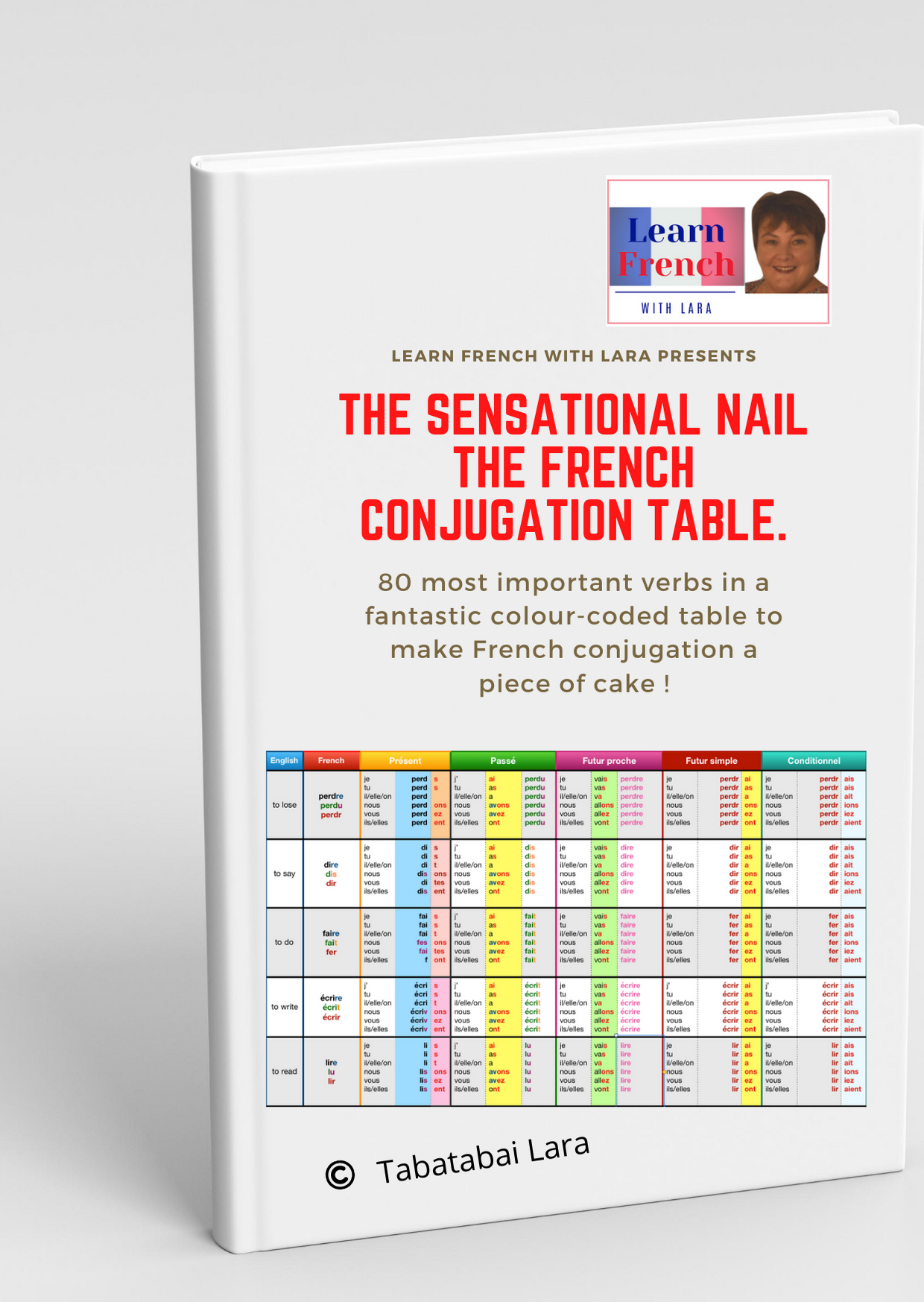
Thank you for visiting Learn French with Lara
The sensational 'nail the french conjugation table'. learn how to conjugate easily thanks to this color-coded method all 80 most common french verbs .
REQUEST A QUOTE
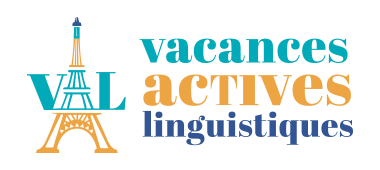
Telling your holidays in French
Drrriiiiiiing !!!
It is the start of the new school year, students and learners of French are back to lessons!
How to restart the brain gently? Telling your holidays in French is an excellent back to school exercise to keep your mind on vacation a little longer.
Vacances Actives gives you the right tips to make the start of the new school year a pleasant one that refreshes your French as a Foreign Language (FFL) skills and stimulates exchanges!
Recounting one’s holidays: a complete linguistic exercise
Holidays, a good subject to create an exchange and integrate.

At the start of the school year, the first lessons of the year can impress students and it is important to facilitate dialogue between them . Whether a learner is shy or not, speaking is never an easy exercise in a new group whose members you don’t know. And the task falls to the teacher to stimulate the pupils and to encourage them to speak. Recounting your holidays in French is an excellent “ice breaker” : in turn, or as part of a two-person dialogue, the pupils share their experience and describe their holiday destination. Travel, sport, leisure, geography: so many subjects that allow students and teachers to find common points and perfect topics of conversation to facilitate their integration.
A story that mobilizes a lot of knowledge in French
“En juillet, je partis à Nice et j’ai allé à la mer”. ( = with mistakes :“In July, I left for Nice and I went to the sea”. )
Coming back from vacation can be hard for the learner’s brain. We will not hold it against him, these mistakes are very common!
First of all, recounting one’s vacation requires using the concordance of times from the past. Here is an opportunity to work on the conjugation and use of the past tense, simple and imperfect past. This exercise is not suitable for all language levels, but it can be adapted with a simplified version, using only the past tense. Here is a good introduction to discover this grammatical tense, if it is on the program for the year.
Also, recounting one’s holidays is an opportunity to express one’s preferences, feelings and emotions . ‘I liked, I preferred, I loved, I regretted, I hated…” : so many personal formulas to testify to a moment or a pleasant or not pleasant activity. This exercise opens up many possibilities for discussion. And for those who have not had the chance to go on a trip, the exchange can be oriented towards the wish, the future desire to discover a destination, or to do a particular activity.

Describing one’s holidays: a wide range of vocabulary

The description exercise is an effective way to mobilize a lot of French vocabulary words . Many lexical fields can be used, depending on the activities and the destination in question. It is a good idea to provide students with vocabulary sheets to help them describe their vacation. The sea, the mountains, the countryside, sport, leisure, transport, accommodation, weather, geography, etc. are among the main themes that can be used for this exercise.
In particular, very dense vocabulary supports can be found on the site: https://www.lepointdufle.net/pseigner/lexique_vacances-fiches-pedagogiques.htm#h
Exercise materials to tell about one’s holidays in French
Orally: a set of questions relating to the holidays.
In pairs or in the form of a group forum, the exercise which consists of recounting one’s holidays can be easily set up with a set of questions . It is true that at the resumption of lessons, learners generally have difficulty finding their words and developing a speech in front of others. It is up to the teacher to guide them through a framework of dialogue:

- Did you go on vacation this summer?
- Where did you go?
- At what period? How long ?
- With whom did you go)?
- How did you spend your time? What activities? What visits have you made?
- Have you had any meetings? (a question open to several interpretations!)
- Did you speak French during the holidays?
- What do you plan to do for the next vacation?
If the speaking is still too timid and the students are not very verbose on the subject, then an ultimate exercise can help them. The idea is to ask them to identify which student in the group has had a vacation most like theirs ! As a result, the pupils question the others in the form of a game and discover a maximum of common points. A good way to untie tongues.
In writing: essay or travel diary
For higher French as a foreign Language (FFL) levels, it is interesting to work on written expression on this question. In writing, an essay for example, the story of the holidays can be developed further but the exercise will lose its interactive and playful side.
On the other hand, to tell their vacation, students can rely on their travel diary. This can be used as “summer homework”. The travel journal is a very effective activity for working on students’ written expression and creativity. We have devoted a generous article to it with tips and suggestions: Create your linguistic travel diary. Some teachers go so far as to organize contests within the class!

The postcard exercise
Writing a postcard is a tradition that is being lost… It is an opportunity to revive it and to suggest that the pupils tell their holidays in French in a reduced format. It only takes a few minutes for learners to address the postcard to the person of their choice. This approach is well suited to the first levels of FLE: it allows students to give a synthetic account of their adventures. Borrowing in the telegraphic style or with a more literary tone, they use a few well-chosen words to quickly describe the destination and give their impressions.
The teacher can play the game to the end by printing a nice photo in the appropriate format to illustrate the vacation destinations of his students, or provide a set of ready-to-use postcards!

Tell your holiday stories on Instagram !
Why not do this exercise on social media? Teachers, you can create an Instagram account dedicated to your class, and start the exercise. Students should choose and post a photo and then write a clear description. Destination, anecdotes, exciting visits… The end result: an aesthetic and complete picture illustrating the holidays for the whole FFL class, to show and share!

Summer peregrinations are an excellent topic of conversation and story to mobilize knowledge and develop French vocabulary.
The exercise can very well be applied when returning from a language study trip, where each of the learners will share an anecdote or an opinion on the trip made.
So many good ideas to encourage travel and learning French!
Visit France during the Paris Olympics in 2024
Carnivals in provence, new year in france: traditional celebrations or something special , privacy overview.
All the French holidays, traditions, and celebrations (by month)

- Post category: Facts and history / French Holidays
- Post author: Nassie Angadi
There are 11 public holidays in France. But there are a lot more French national holidays, celebrations, and traditions during the year that don’t necessarily come with a day off.
And having lived in Paris for over 10 years now, I’ve noticed that there is a particular rhythm dictated by the calendar to French people’s lives, much more so than we have in North America.
Whether it is a jour férié (meaning “public holiday” or “bank holiday”) or not, there are certain events in the french calendar that makes everyone sit up and take notice.
French people have a lot of holidays from work , and the kids have even more holidays than the adults. This means there are a lot of periods when everybody has more of a tendency to be on holiday than others.
And even if it isn’t a day off, there are plenty of other quirky French celebrations involving crêpes, parties with neighbors, festivals of music, etc. It is part of the culture and the fabric of French society .
And you combine that with each significant day having its own tradition, and you have the French way to celebrate, if you will. So let’s uncover the main French national events and holidays, shall we? Allons-y!
vi) La Grande Odyssée Savoie Mont Blanc
Iii) carnival de nice, iv) sarlat fest’oie, iii) spring school holidays, v) fête des mères – mother’s day, iv) french open tennis tournament (roland garros), iv) le tour de france, iv) fête du jasmin in grasse, vi) montgolfières in rocamadour, vii) fêtes des sorcières, vii) salon du cheval de paris.
- viii) Réveillon du Nouvel An – New Year's Eve
1. Janvier – January
I) jour de l’an – new year’s day.
- Public holiday in France: Yes
- When: January 1st
Like the rest of Europe and the Anglo-saxon world, France follows the Gregorian calendar, meaning you get to go around at midnight on New Year’s eve wishing everybody Bonne Année and have a holiday.
French people will usually continue greeting people Bonne Année the first time they see them that year, even if they are deep into January. And along with Bonne Année , you can also add Bonne Santé , meaning “Good health”.
ii) Jour de l’Epiphanie – 3 Kings Day
- Public holiday: No
- When: First Sunday of the year
Three Kings day is not a public holiday but it is an important day in the French calendar. This is the day (or week) when French people get to pig out on a pastry from Brittany called the galette de roi.
The pastry usually has a tiny figurine called a feuve is hidden by the baker within the galette de roi, and the person who finds it is crowned King or Queen for the day.
iii) Winter Sales
You might think it is dreary to visit Paris in January , but the official Winter sales period ( les soldes d’hiver ) will start the 2nd week of January for four weeks. Who says there is nothing to celebrate in January?
It is a very busy time in stores, so be prepared to have your elbows out while shopping!
iv) Carnival de Limoux
It is the start of the carnival season in France with one of the oldest carnivals being held in Limoux in the Occitanie (near Toulouse and Carcassone ). It actually lasts 3 months from the end of December to the end of March /start of April .
v) Truffle Festival in Sarlat
Each year in mid-January, the town of Sarlat-la-Canéda in the Dordogne region hosts a famous festival celebrating the truffle.
With music and festivities, along with markets selling fresh truffles and related artisanal products, you can learn everything from how to find and pick truffles to how to cook them.
La Grande Odyssée Savoie Mont Blanc is an international sled dog race spanning 900 kilometres (560 miles) in French Alps in the former duchy of Savoy (around Chambéry ).
Over 50,000 visitors head over every year to enjoy the festivities that include everything from pistes de luge to building igloos. You can read more about visiting France in January here.
2. Février – February
I) la chandeleur – candlemas day.
- When: 2 February
Like on 3 Kings Day, Candlemas is another Catholic religious event and French celebration that isn’t a public holiday, but it is nonetheless important. And that’s because it is the day to invite your French family and friends over for crêpes .

This is not to say French people don’t eat crêpes all year long, but Chandeleur is a bit of a crêpe-athon. And while crêpes are not usually served on Valentine’s day , they are still ubiquitous all month long.
☞ READ MORE: Crêpe Suzette: To Flambée or not to Flambée?
ii) Winter School Holidays
School is off for 2 weeks all across France at the end of February, beginning of March. The weeks are staggered based on the zone that the region falls into.
Two weeks off of school that means that it is time for the requisite family ski holiday! If you do plan on coming to the French Alps to ski, I recommend checking when the school holidays are and planning the best time to hit the slopes .
If you are not a skier, not to worry, there are plenty of other places to visit in France in winter . You can read more about visiting France in February here.
The Carnival de Nice is the biggest carnival in France , held over two weeks in February and March . Located on the French Riviera , the parade features the city’s boardwalk Promenade des Anglais prominently. There are several events across Mardi Gras in the downtown of Nice , with the biggest highlights being:
- Carnival Parade – held during the daytime with large floats, dancers, acrobats, confetti and more
- Carnival Parade of lights – in the evening with large illuminated floats, visual animations of big screens, and fireworks
- Flower parade and the “battle of the flowers” – large floats covered with flowers and costumes models throwing flowers into the crowds.
The original parade dates back to 1873, with the flower parades being added on in 1876. You can read more facts about Nice here.

3. Mars – March
I) fête des grands-mères – grandmother’s day.
- When: 1st Sunday in March
Unlike North America which celebrates both grandparents together in September, in France, Grandmother’s day is in March, while Grandfather’s day is in October. It was a holiday created in 1987 for commercial purposes by the coffee brand Grand’Mère , but nevertheless French people do oblige by sending Mamie a bouquet of flowers.
The usual flowers offered are those in season such as the lys or tulips, usually in white or pink. Avoid yellow or red as those colors are meant to signify passion. You can read more about France in March here.
ii) Mardi Gras in Nice and Menton
The Carnival de Nice is the biggest carnival in France , held over two weeks in February and March . Located on the French Riviera, the parade features the city’s boardwalk Promenade des Anglais, with floats, bands and music over several days.
Another famous carnival in France at around the same time is the Fête du Citron (Festival of the lemon) in Menton and is to mark the end of winter. With floats made out of lemons and a party atmosphere, this festival attracts over 200,000 people a year.
The festival dates back to 1875, and even Queen Victoria of the UK was known to have made a visit.
iii) Fêtes des Violettes
A few miles away from the coast in Provence is the small town of Tourrettes-Sur-Loup which is known for its violet confectionery and artisan shops.
Every March, this small medieval village has a big violet celebration, including farmers’ markets, parades, and even a battle of the flowers.
If you enjoy foie gras, head to Sarlat in the Dordogne where the first weekend of March a celebration of foie gras is held. Oie translates to goose in French.
With farmers’ markets selling foie gras, cooking demonstrations, and other workshops, the festival of foie gras is an interesting way to learn about this traditional French delicacy.
4. Avril – April
I) 1er avril – april fool’s day.
April fool’s day doesn’t have a special name in French; which is not to say that it is not celebrated. Known as “ 1er avril ” or “ premier avril “, it simply means the 1st of April.
Nonetheless, it is believed that the tradition of merriment on April Fool’s actually originated in France, when the French King Charles IX decided to move the start of the new year from the end of March, to the start of December.
Today, the favorite prank of French children for April fools is stick a “poisson d’avril”, meaning a paper fish, on the back of the person they are trying to prank. You can read more about April fools in France here.
ii) Lundi de Paques – Easter Monday
- When: Based on the Jewish calendar, Easter falls on the Sunday after the Passover full moon
While Good Friday is usually the public holiday in North America, in France it is Easter Monday . Only Alsace and Moselle have Good Friday off as well.
An interesting note is that there is no Easter Bunny in France. Lapin (rabbits) are considered a delicacy so it would be difficult to explain to your little Frenchie why you are eating that cute little rabbit who gave you some chocolate eggs.
It has been 6 weeks since the Winter school holidays, so time for school to be out for 2 weeks again!
No one has any idea what to do with the kids, so its off to the grandparents or the centre de loisirs (meaning “leisure center”). You can read more about France in April here.
5. Mai – May
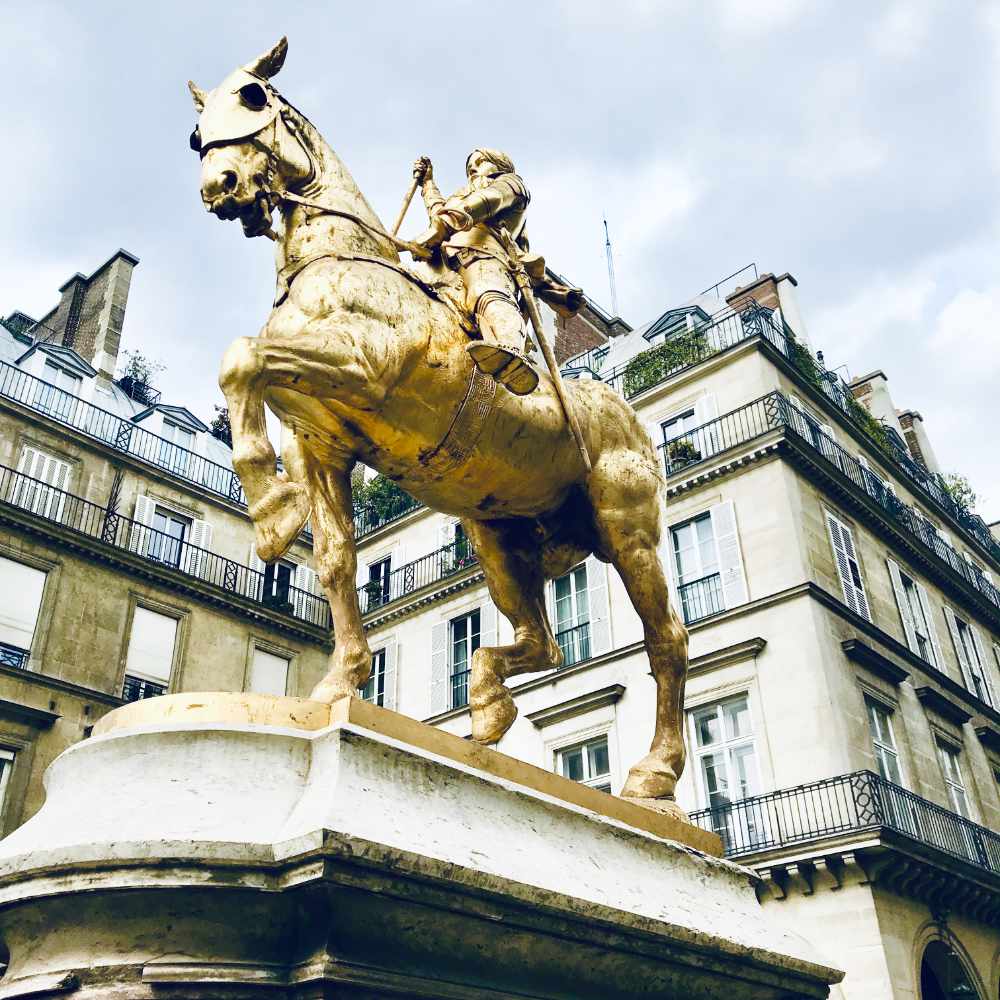
With several public holidays in May, this is usually the month where the average French worker does the “ faire le pont “. Which is to say, if the public holiday falls on a Tuesday or Thursday, they will take a vacation day on the Monday or Friday for an extra-long weekend.
Don’t expect to get too much work done in May, because 1/2 your co-workers will probably be on holiday.
i) Fête du premier mai – Labor day
- When: May 1st
Labor day in France is not in September, but in May. It is a public holiday, and in Paris you will see large demonstrations and protests by unionists for May Day . You can read more about employee benefits in France here.

Even large museums like the Louvre will be closed on May 1st so check on their website if you are planning a visit.
In addition, the muguet flower which is known in English as the lily of the valley, is traditionally offered in France at the start of May as a token of the coming spring and to bring good luck .
ii) Jour de la Victoire en Europe – Victory in Europe day
- When: May 8th
The end of World War II in Europe is an important holiday in France. With older generations still able to recount the wartime horrors in France , the day is marked with military memorials with foreign leaders.
iii) Jour de l’Ascension – Ascension Day
- When: Thursday, the fortieth day after Easter
It is the 3rd public holiday in May, so many people “faire le pont”, which is take a “bridge” vacation day to string together a longer holiday. If you are a business trying to get some work done in May, be prepared to have a good percentage of your coworkers on holiday.
iv) Fête des Voisins – Neighbors’ Day
- When: Last Friday in May
It is not a holiday, but an evening when you are supposed to get together with the neighbors in your building for a moment of conviviality. It is usually organized in potluck style, with everyone bringing a little something.

- When: Last Sunday in May, except if it conflicts with Pentecôte (decreed by French government
French people love their moms, too so it is Mother’s day ! The standard greeting to your French maman is Bonne fête Maman ! with flowers and/or some chocolates. You can read more about May in France here.
6. Juin – June
I) lundi de pentecôte – pentecost.
- When: 50 days after Easter
Another Catholic holiday, which is also called Whit Sunday in the U.K. In France it is mostly just a holiday in June to recover after all the May holidays, before the big summer vacation starts.
ii) Fête de la Musique – Festival of Music
- When: June 21st
It is not a public holiday, but it is a day to mark on the calendar nonetheless. All over France, and especially Paris will turn into a giant music street festival. Small bands, musicians, and just about anyone and everyone will take to a street corner to play their favorite hits.
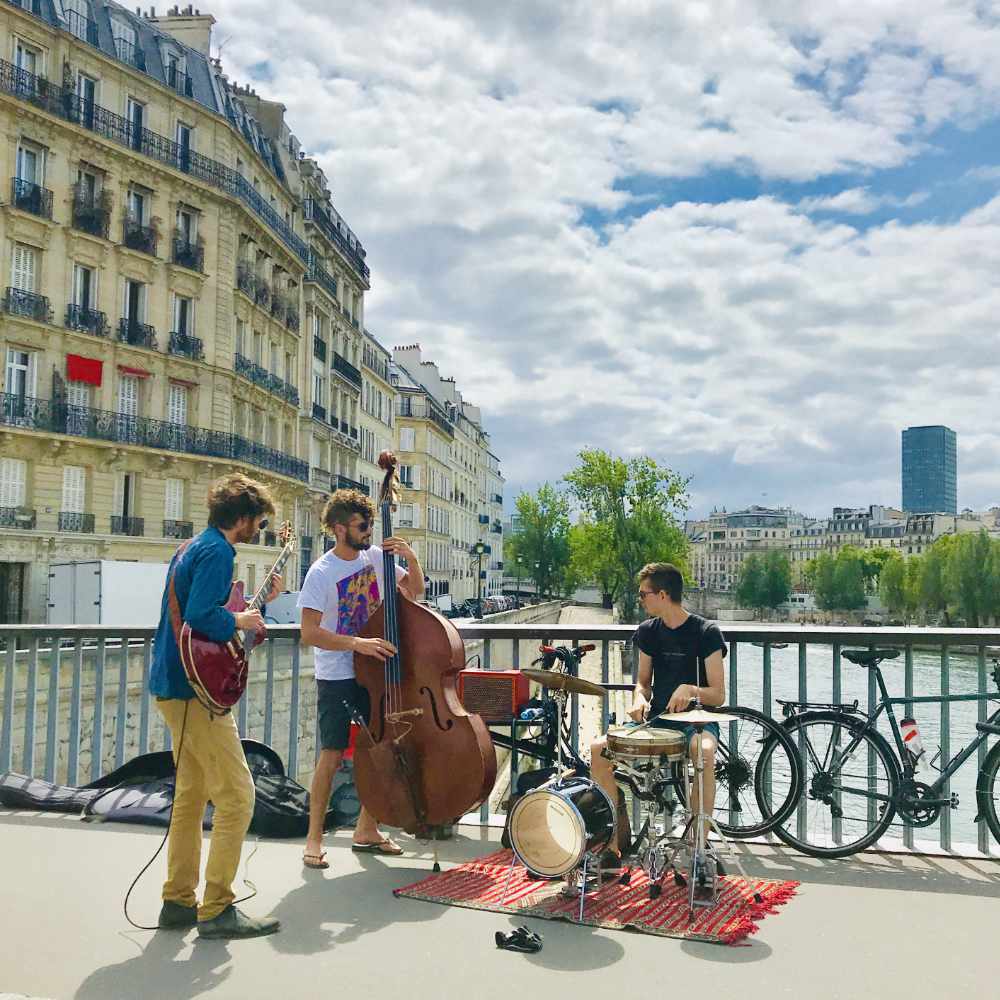
The party goes on late into the night in Paris, so wear your walking shoes so that you can band hop with the locals.
iii) Summer sales
If you missed the soldes d’hiver (winter sales) back in January, have no fear, it is time for the soldes d’été ! The summer sales start in the last week of June and run for 4 weeks during the dog days of summer. You can read more about June in France here.
If you are in Paris, you can catch the final rounds of the Roland Garros French tennis open which began in late May and wraps up in early June.
The tournament is named after the French aviator Roland Garros, and is played at Stade Roland Garros near Bois de Boulogne in the 16th arrondissement of Paris .
7. Juillet – July
I) end of school.
Surprisingly, School in France doesn’t end until the 1st week in July, although older children (high school) have usually finished their annual exams and are in cruise control. There is not much that goes on in school after the end of June.
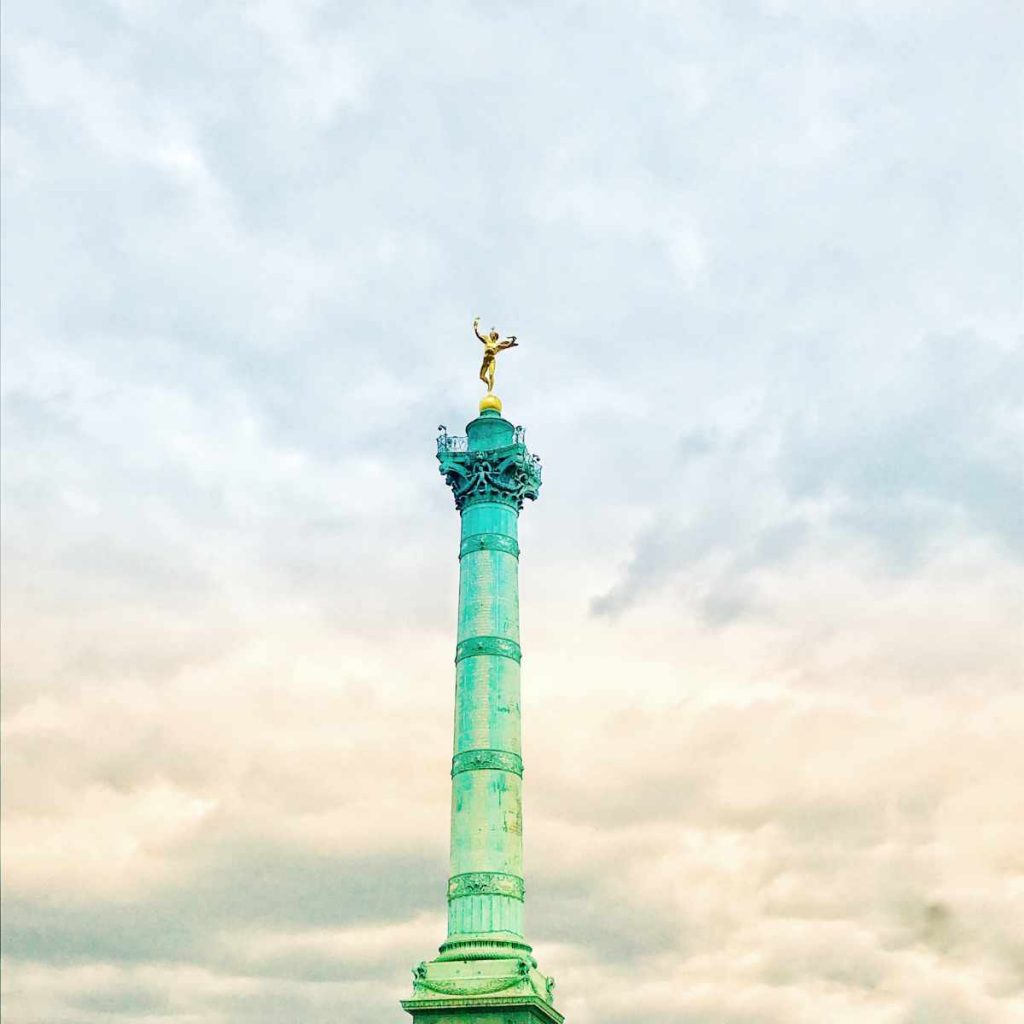
ii) 14 Juillet – Bastille Day
- When: 14th of July
Interestingly, the date of the French Revolution (in 1789) is simply called by its date, Quatorze Juillet , and not Bastille Day as anglophones call it. The term “Bastille day” doesn’t really mean anything to the French.
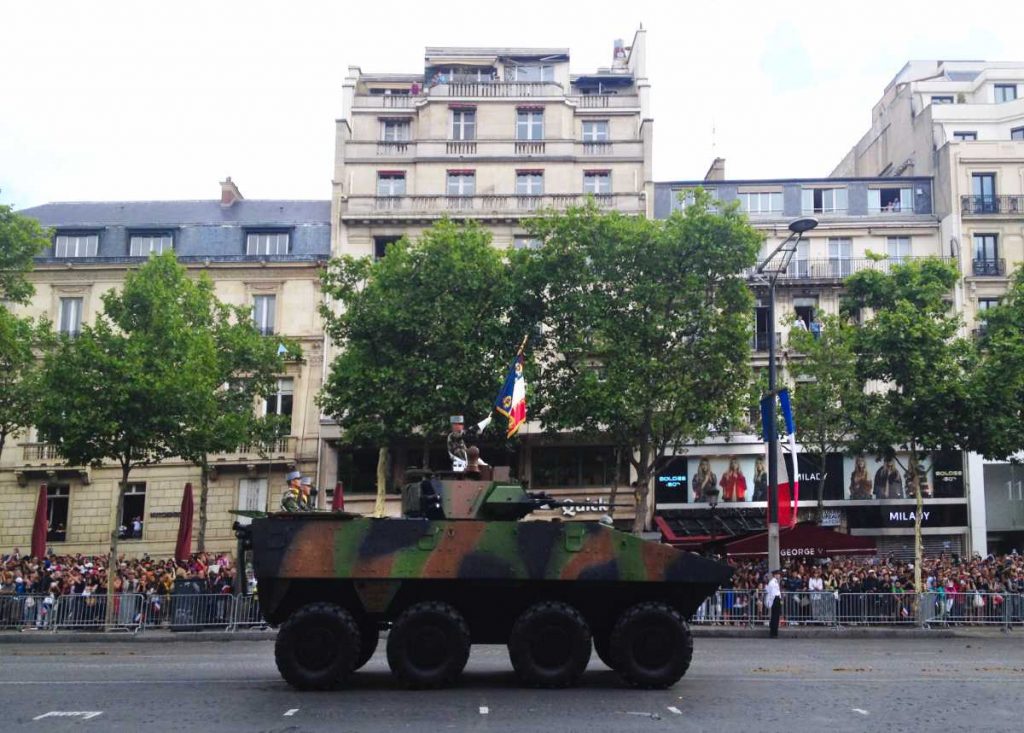
The day is usually marked in Paris by a giant military parade with tanks, military regiments, horses, etc. The President of France usually hosts a foreign leader and gives a speech proclaiming “ Vive la France! ” and with the playing of the national anthem .
The crowd favorite, however, is always the traditional flyover by the different types of aircraft in the French Air Force. (Note there are no celebrations around the actual Place de la Bastille. )
Pro-tip: You will usually hear them practicing overhead on July 13th, from over La Défense over to the Champs Elysées and back.
You can read more about how French people celebrate Bastille day here.
iii) Juilletiste – July holidaymaker
There are two types of people in France: the Juilletiste and the Aoûtien . Those who take their annual 3 weeks off in July, and those who do so in August.
If you are impatient, you take off July, when prices are slightly cheaper. Otherwise, you try to maximize your summer in the city, waiting for your August holidays. You can read more about July in France here.
The most prestigious bike race , the Tour de France starts on the 1st of July and runs all through the country. It starts at a different location every year and consists of 21 stages, each a day long, over the course of 23 days.
The final stage and grand finalé always in Paris, with the winner awarded the yellow jersey on the Avenue des Champs Elysées in front of cheering crowds.
8. Aout – August
I) jour de l’assomption – assumption day.
- Public Holiday in France: Yes
- When: 15 August
For Catholics, this is the day when the Virgin Mary goes to heaven. For most French people, it is a day off in the middle of August that doesn’t count against their work-vacation allotment.
It was Napoleon Bonaparte in 1802, who established these religious days as national holidays, one for each season:
- Ascension in spring (May)
- Assumption in summer (August)
- All Saints in autumn (November)
- Christmas in winter.
ii) Festival Interceltique in Lorient
Every year the town of Lorient in Brittany has a festival owing to its Celtic past , that attracts over 700,000 festival-goers from all over Europe. The festival is usually held in the 2nd week of August, with Celtic music and marching bands on feature.
With plenty of good food and dancing, this is a real celebration of Gaul and Celtic culture in a land where the Breton celtic language is still spoken.
iii) Aoûtien – August Holidaymaker
It is the dog days of summer in France when most people take their 3 weeks off. (Remember, most places in France don’t have airconditioning .) Cities like Paris are empty, abandoned to the tourists.
If you are a July holidaymaker who has returned to work in August, you are expecting very slow days at work, where almost everything is at a standstill.
In addition, if you are in a larger city, you may find that outside the tourist places that are open, many of the restaurants and shops nearby are also on their annual holiday.
The perfume town of Grasse celebrates the Fête du Jasmin or La Jasminade every August , which is always fun to watch.
Decorated floats drive through the town, with people throwing flowers into the crowd. Garlands of jasmine decorate the town center, and there are also fireworks, parties, and street performers.
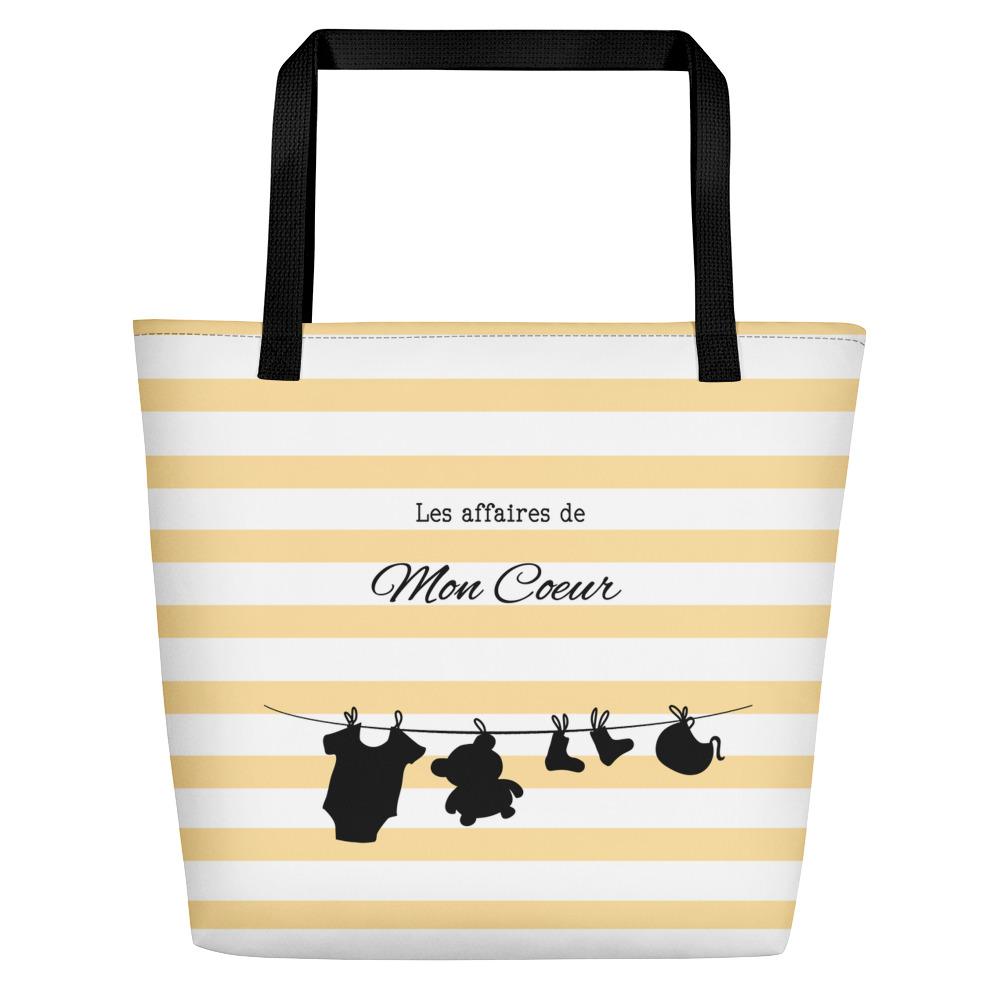
9. Septembre – September
I) jour de rentrée – back to school day.
- Public holiday: No *
- When: First Monday in September
The big day back to school ! And for adults to get back to the grindstone! If there are projects at work that you have been putting off all summer, you now have to get back to it. ( Read more about la Rentrée. )
* Note: The day itself is not a holiday, but most companies have negotiated with their union to provide the day off for parents of small children. French parents usually take the day off to drop their kids off school, (though you do not get 2 days off if you have 2 small children!)
ii) Journées du Patrimoine – Heritage Day
- Public Holiday: No
- When: 3rd weekend in September
This is not a day off, per se, but rather a weekend to go behind closed doors. Most major government buildings and institutions will open their doors to visitors all weekend long. Lines are usually long for favorites such as the Palais Elysées (official residence of the French President) , Assemblée Nationale , and the television studios of France 2 (the French equivalent of the BBC).
If you plan on going to any of the hotspots, be prepared to line up as early as 6am, if not earlier. You can read more about France in September here.
iii) Braderie de Lille (Lille flea market)
With over 10,000 exhibitors in the streets, the city of Lille in the north of France hosts the world’s largest flea market. It is usually held the first weekend of September, attracting millions of people every year.
It is believed that the first annual flea markets in Lille date back to 1127 and is a big festival in the city. With various stands, local foods, a half-marathon, and parties late into the night, there is something for everyone.
iv) Féria du Riz in Arles
If you enjoy a good paella, you will want to head to the Camargue and the city of Arles near the French-Spanish border . It is usually held in the 2nd week of September (as well as in April ) and is a bull-fighting festival that takes place to celebrate the rice harvest.
The rice used in a paella is a short grain rice that is grown in the department of the Camargue which has a strong Spanish influence.
v) Fête de la Gastronomie
A newer festival around France is the Fête de la Gastronomie . It is an initiative of the Ministry of Crafts, Trade and Tourism launched in 2011, and is celebrated in the last week of September.
It takes place throughout France and is meant to promote the French culinary heritage . Some smaller towns and villages will promote their local fares, but it has yet to catch on with restaurants in larger cities like Paris.
More common is local and artisan food markets that will hold special events to promote their produce. Lyon , which is considered the French capital of gastronomy, holds a street food festival with tastings, picnics and other festivities.
In the last weekend of September, a spectacular sight takes place in Rocamadour, a small clifftop village in south-central France .
Around 30 hot air balloons take flight over the valley to pay tribute to the inventors of the Montgolfières , the Montgolfier brothers who were from nearby Ardéche.

10. Octobre – October
I) fête des grands-pères.
- Public holiday : No
- When: 1st Sunday in October
The grandparents may not be celebrated together, but Grandfather’s day only dates back to 2008. Being a newer holiday, there is no particular tradition of gifts for Papy , so you can wish him as you please.
ii) Fall School holidays
School may have just started in September, but 6 weeks after the 1st day of school, it is school holidays again! Kids are off school for 2 weeks from the end of October to the start of November, depending on their region. Time for a fall holiday somewhere, if the parents can afford to take some time off.
French adults usually have on average 6-8 weeks holiday , but it is not enough to make off for all their kids’ school holidays. Time to send the kids to the centre de loisirs (leisure center) or call in the grandparents!
iii) Nuit Blanche in Paris
Inspired by the 1989, Helsinki’s Night of the Arts, Nuit Blanche in Paris is is a special event when art takes over the city. Every art gallery and museum is open until midnight or later and artists are invited to install their creations on the street for passersby and art lovers everywhere to admire.
Nuit blanche translates to “white night”, and is the French expression for the all-nighter. The French nuit blanche has now been exported to over 120 countries across the world.
iv) Fête de la Bière – Oktoberfest in Alsace
The region of Alsace has been fought over by France and Germany for centuries . It only finally became part of France after WWII. So it stands to reason that the region would keep some of its German traditions , among them being Oktoberfest.
It is held in Strasbourg and Colmar and various small villages in the area with large beer gardens with plenty of singing, sausages, and sauerkraut. You can also visit the Alsace wine route at the same time, which should just be wrapping up their yearly wine harvest .
v) Lumière Film festival in Lyon
Celebrating the Lumière brothers who invented the cinema as we know it, is the Lumière film festival that is held every October in Lyon.
While smaller than the Cannes and Deauville film festivals, it is still features hundreds of French and foreign films.
vi) Halloween
As I mentioned, Halloween on October 31st is not really celebrated in France. The 1st day of November, or All Saints’ day , is a public holiday however.
You will not see kids going door-to-door trick-or-treating. And even if they did, there would likely be no candy. French neighbors don’t stock up on candy on Oct 31st, so I know other North American moms who go and drop off little bags of candy at their neighbors to subsequently hand out.
There are a few small parties that are held among expat groups, but certainly not the big celebration that you would see in North America. You can read more about Halloween in France here.
These days, several cities in France celebrate the Fête des Sorcières , festival of witches towards the end of October. If you are interested in attending, the biggest ones are in:
- Lille (Haut de France)
- Chalindrey (Grand Est)
- Morbecque (Haut de France)
- Pennes Mirabeau (Provence)
You can read more about France in October here.
11. Novembre – November
I) la toussaint – all saints’ day.
- When: November 1st
Halloween on October 31st may not be celebrated in France , but its historical cousin All Saint’s day is.
Known as Toussaint in French, it is an occasion to remember the dead. Chrysanthemums are laid on gravestones of the dearly departed. (For those superstitious , these flowers are never offered to the living.)
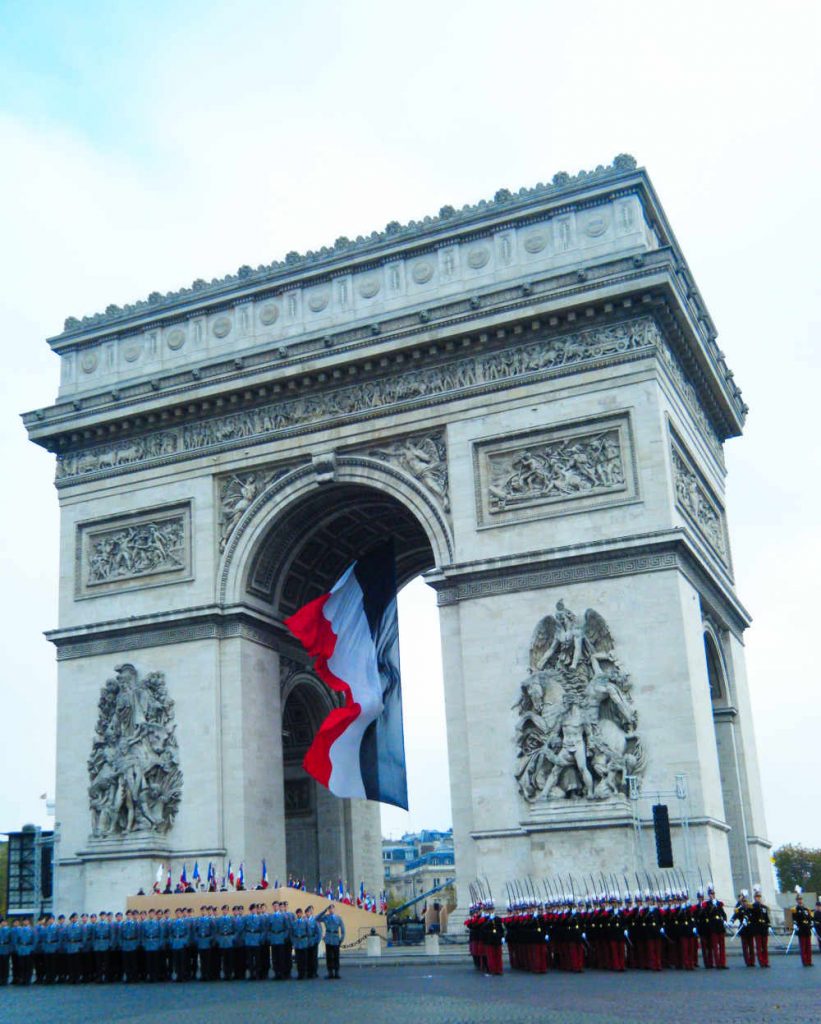
ii) Jour anniversaire de l’Armistice – Armistice Day
- When: November 11th
The anniversary of the end of the First World War is marked with solemnity here in France. Having been invaded in both WWI and WWII, the day is a national holiday with remembrance services being held on the Arc de Triomphe and Champs Elysées.
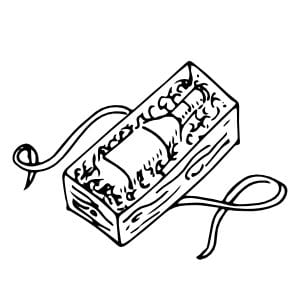
iii) Jour de Beaujolais Nouveau – Beaujolais Nouveau day
- Public Holiday in France: No
- When: 3rd Thursday of November
If you have been in Paris on the 3rd Thursday of November , you will have seen the signs announcing that the “ Beaujolais Nouveau est arrivé! ” (meaning “the Beaujolais Nouveau has arrived”). One of the quirkier French celebrations, this one is all about the wine harvest .
The Beaujolais Nouveau is a young wine that doesn’t need to be aged, so local vineyards would race to press their grapes into wine and rush it up to Paris to be the 1st.
A marketing strategy but one that worked, because Beaujolais Nouveau is now celebrated in many other cities like London and New York as well.
iv) Fetes des Vins de Chablis
The village of chablis in the Bourgogne (Burgundy) festival has its annual festival to celebrate the chablis wine harvest in November. The chablis is a white wine made from the Chardonnay grape.
Local producers gather in the heart of the village to offer tastings and enter their wines in local competitions under a festive atmosphere.
v) Fête du Hareng in Normandy
If you like fish, several towns in Normandy like Dieppe, Fécamp, Tréport, and Saint-Valéry-en-Caux celebrate the Fête du Hareng (Herring festival) every November .
Considered the “King of Fish”, it is a big part of the culture and economy in Normandy. As the French history lesson goes, it was 1429 during the 100 year war. The city of Orleans was under attack and besieged by the English.
Somehow, the French managed to cut off the food supply wagons of herring destined for the invading English, and after a famous battle, managed to liberate the city. All because of the herring.
You can taste it in all its forms during the festival, but the classic version is herring marinated and grilled, with a little lemon or white wine.
vi) Festival de la Soie (Silk Festival) in Lyon
The city of Lyon used to be known for its silk industry, and this savoir faire is still celebrated with Festival de la Soie every November. Local exhibitors will present original and modern designs demonstrating their craftmanship and creativity.
The show attracts professionals and amateurs who wish to participate in demonstrations and learn about these age-old techniques.
Salon du Cheval de Paris (Paris Horse Show) is an annual event dedicated to horses and riding with over 450 exhibitors and 2,000 horses. The event occurs each November, gathering around 150,000 visitors over ten days.
You can read more about visiting France in November here.
12. Décembre – December
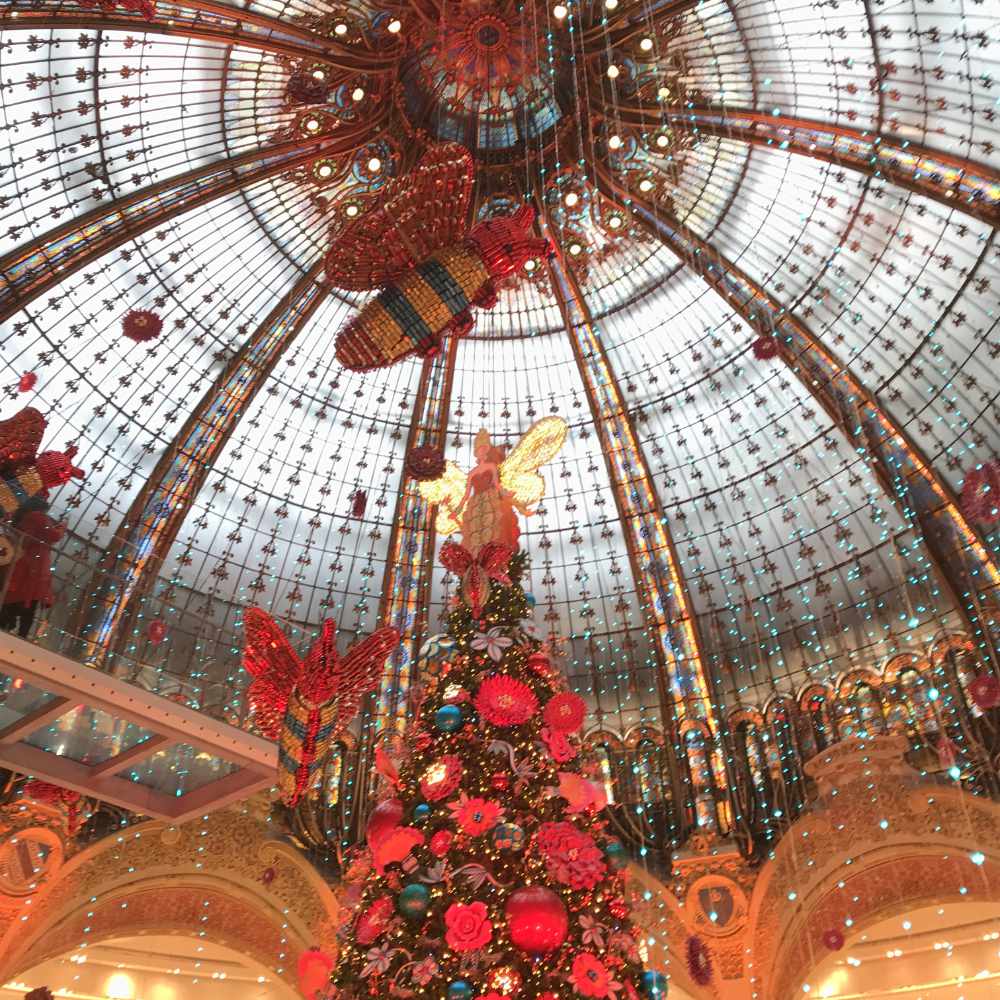
i) Fête des Lumières in Lyon
The festivities start in early December when the city of Lyon lights up its major landmarks with a magnificent festival of lights. Special shows with music and illuminations are held every night for 3 days in the 2nd week of December, attracting millions of visitors.
ii) Foire de la Saint André in Annecy
Held the first Tuesday of December in Annecy , the Fair of Saint Andre dates back over 5 centuries. More than 1,100 traders covering over 5km over the city set up shop, attracting tens of thousands of visitors.
iii) Réveillon de Noël – Christmas Eve
- When: December 24th
Schools are usually closed during this period (see school holidays below), but most businesses are open, with offices usually letting people off work at 3-4 pm. Traffic is usually quite crazy in the Greater Paris Area at this time.
iv) Jour de Noël – Christmas Day
- When: December 25th
France is a secular country, but Christmas is Christmas. There are many French Christmas traditions , but it is the traditional dinner that is the most important.
A French Christmas family dinner will on average lasts 4-5 hours. (Time measured by my own statistical study, of course.) It usually takes place on Christmas eve or Christmas day lunch and will feature everything from seafood to foie gras, several different types of wine and champagne, and much much more. Better have some stretchy pants handy!
☞ READ MORE: Top French Christmas carols that will fill you with some festive spirit
Note: there is no Boxing Day in France on December 26th because as mentioned above, the official Winter sales period ( les soldes d’hiver ) will start the 2nd week of January.
v) Marché de Noël
If you live in France, you know Christmas is coming once you start seeing the booths being installed in your town or neighborhood.

The most famous Marché de Noël in France is the one in Strasbourg , but the one next to the Champs Elysées in Paris is not too shabby either.
With small rides, Christmas trees for sale, and everything from cheese , meats, lavender products , and any other artisanal product you can think of, these little Christmas markets will put a smile on anyone’s face.
Enjoy a raclette cheese sandwich and a vin chaud (or a non-alcoholic version ) while you do your Christmas shopping. You will also find many towns setting up small ice skating rinks outdoors over the holiday season, which are usually offered for free to small children.
vi) Festive Shop windows
Many of the large department stores, especially the ones in Paris , will have elaborate festive windows that are sure to please young and old. Shops like Galerie Lafayette and Printemps in Paris are known for their custom holiday windows, and it does get quite crowded with children.
Special Christmas offers are sometimes also on display, although the big sale season is usually in January .
vii) Christmas School holidays
Well it is Christmas and New Year, so time to give everybody some time off! The last week of December and 1st week of January (2 weeks) are usually off for all school children.
Time for more help from the grandparents. You can read more about December in France here.
viii) Réveillon du Nouvel An – New Year’s Eve
- When: December 31st
New Year’s eve is also known as la Saint-Sylvestre after Pope Sylvestre I. For most local Parisians, the tendency is to go to someone’s house for a party rather than go on the Champs Elysées (which is reserved for tourists), or an expensive dinner out.
Note: There are no fireworks at the Eiffel Tower , the festivities are on the Champs Elysées. So go for an apéro-style drinks and dinner with friends, and then counting down late into the night… It is New Year’s Eve, baby!
How to say “Holiday” in French?
The word for public holiday is “ Jour Férié ” meaning “day off”.
How to say “Happy Holidays” in French”?
To generally wish someone “happy holidays” when they are going off on vacation, the phrase in French is “ Bonne Vacances “. However, if you are saying “happy holidays” to wish someone for the Christmas holidays, then the phrase in French is “ Joyeuses fêtes “.
So are you feeling festive yet, after all those French celebrations? If you enjoyed this article, you may want to read more about the French revolutionary calendar . (Hint: the French tried to make a week include 10 days instead of 7, and 3 weeks in a month instead of 4. You can guess how it turned out.) A bientôt!
You Might Also Like
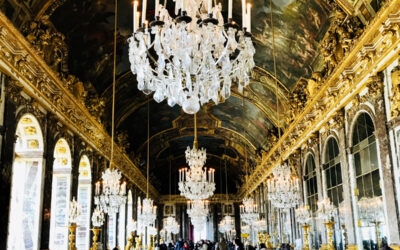
Hall of Mirrors at Versailles: 16 Incredible facts and history
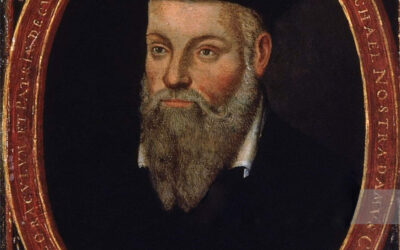
Nostradamus: the Frenchman who predicted the future

French Chandeleur: Celebrating Candlemas with crêpes
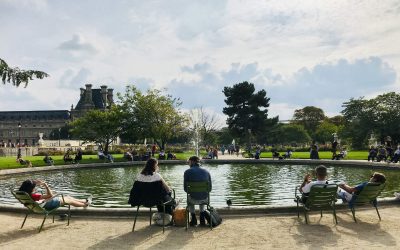

Tuileries Gardens: In the footsteps of the Royal Palace that burnt down (Paris)
Leave a reply cancel reply.
- Paris & Île-de-France
- Alsace & Lorraine
- Bourgogne-Franche-Comté
- Bretagne & Normandy
- Auvergne Rhône Alpes
- Loire Valley
- Northern France
- Nouvelle Aquitaine
- Provence & French Riviera
- Living in France
- French Parenting
- French Holidays
- French Language
- French Etiquette
- French Music
- Moving to France
- Facts and history
- Appetizers & Starters
- Main dishes
- Side dishes
- Get the Look
- Newsletter archives
- Sites and Monuments in Paris
- Sites and Monuments in France
- Things to do in Paris
- Things to do in France
- ACCOMMODATION
- RENTING A CAR
- CHEF SERVICE
- CONCIERGERIE SERVICES
- TRAVEL TIPS
- TRAVEL LUGGAGE
- Arrondissements
- Monuments & Landmarks
- Secret & Offbeat Paris
- More about Paris...
- Île de France
- More Regions of France...
- Aix-en-Provence
- More Cities...
- Castles and Palaces
- Cathedrals and Churches
- Gardens and Parks
- World Heritage Sites
- Villages of France
- Autumn / Fall
- Mardi-Gras / Carnival
- April Fools' Day
- Bastille Day
- All Saints' Day
- More Holidays and Celebrations...
- National Anthem
- Gallic Rooster
- National Day
- Motto of France
- Motto of Paris
- Coat of Arms
- French President
- Le Croissant
- French Cheese
- French Wines
- Christmas Food and Recipes
- French Nursery Rhymes
- France geography
- FUN QUIZZES
- MOVIES AND MUSIC
- FRENCH LANGUAGE
- BOOKS BY FRENCH MOMENTS
- BOOK RECOMMENDATIONS
- The Secrets of the Eiffel Tower
- The Gems of Paris
- Office desks and chairs
- Travel suitcases
- LEARN FRENCH WITH PIERRE
- THE STORY SO FAR
- WORK WITH US
- THE NEWSLETTER
- HOW TO SUPPORT US
- PHOTO USAGE POLICY
Last Updated: 6 March 2024
What are the Holidays and Celebrations in France?
In France, we know how to celebrate life on many occasions! Whether you visit Paris or the Province, holidays and celebrations in France will bring an ‘exotic taste’ to your stay. Did you know the French annual calendar is punctuated with eleven bank holidays? As well as several religious, civil and commemorative celebrations. I hope this article will give you insights into what to expect on your next travel to France!
🎥 Watch this short video about the Holidays and Celebrations in France:
Traditions and Celebrations in France
To make life more pleasant, people took part in many festivals in the kingdom of France. Indeed, there were more than a hundred days of festivities during the year!
In addition, every event in the family (engagement, marriage, birth, baptism and even death) was an excellent occasion to bring relatives and a few friends together.
Thus, during the Middle Ages, people gathered according to a strict calendar. And, contrary to what we know today, summer was not a time of festivities.
No summer holidays in the Middle Ages!
Peasants knew that with summer would come the season of heavy work. On Midsummer’s Day , at the end of June, they would gather for one last big party (fête de la Saint-Jean or St. John’s Day). Fires were lit to celebrate the longest day. Young men practised jumping over the flames.
Between Midsummer’s Day (late June) and St. Michael’s Day (late September), everyone was busy either working in the fields, fighting in the war or training for the military.
Traditional festivals in France
Most holidays are sacred. However, religion has often preserved ancient pagan customs, which were attached, for example, to the worship of the sun (the winter solstice at Christmas and the summer solstice on Midsummer’s Day).
In contrast to the summer, festive days are much more frequent in winter and spring.
For example, the Christmas period lasted twelve days with the Feast of the Innocents, the Feast of the Fools, and New Year’s Eve , and ended with the Feast of the Kings with its traditional galette des Rois .
Later on, the following events would take place:
- Candlemas (Chandeleur) – and its candlelight procession,
- Shrove Tuesday (Mardi Gras), the last feast day before Lent
- The first Sunday of Lent (le Dimanche de la Quadragésime), when tradition has it fires are lit to dance around before going through the streets and the countryside carrying lit torches or firebrands.
- Easter (Pâques),
- And many others until Pentecost Sunday .
👉 Become a part of the fun, exciting and entertaining celebrations in France yourself by booking your next French break. When you book your travel using Direct Ferries voucher codes , you can save a bundle and have more spending money for your holiday!
Get the ebook Holidays & Celebrations in France!
288 pages – 117 illustrations
In this book, Pierre reveals the secrets of French celebrations, from the most famous to the least known. It is a cultural journey into French customs and traditions that will satisfy curious readers and lovers of France.
FIND OUT MORE & BUY YOUR COPY!
Major Holidays and Celebrations in France
Holidays and celebrations in France are integral to the country’s popular culture.
Public Holidays in France
The French observe 11 official public holidays.
5 of them are civil holidays :
- New Year’s Day (Jour de l’An),
- May Day (1er Mai or Fête du Travail),
- Victory in Europe Day (8 mai 1945),
- Bastille Day (Fête Nationale), and
- WWI Armistice Day (Armistice du 11 novembre 1918).
6 public holidays have a religious origin based on the Catholic faith:
- Easter Monday (lundi de Pâques),
- Ascension Day (Jeudi de l’Ascension),
- Whit Monday (Lundi de Pentecôte),
- Assumption Day (Assomption),
- All Saints’ Day (Toussaint), and
- Christmas (Noël).
Besides, people living in the two départements of Bas-Rhin and Haut-Rhin in Alsace and the Lorraine département of Moselle enjoy two additional public holidays :
- Good Friday (Vendredi Saint), and
- St. Stephen’s Day (Saint-Etienne – known as Boxing Day in English-speaking countries).
This is due to historical reasons when the three départements were returned to France in 1918.
Celebrations in France
Every season has its share of celebrations and festivals.
- Epiphany (Epiphanie)
- Candlemas (Chandeleur)
- Mardi-Gras & Carnivals (Carnaval)
- Valentine’s Day (Saint-Valentin)
- April Fools’ Day (1er avril)
- Europe’s Day (Journée de l’Europe)
- Mothers’ Day (Fête des Mères)
- Fathers’ Day (Fête des Pères)
- Feast of Saint John (Fête de la Saint-Jean)
- World Music Day (Fête de la Musique)
Holidays and Celebrations in France: local events
Some celebrations in France are local events, including sporting events. Here’s a (very) small list.
Folk Festivals in France
- Lemon Festival in Menton (Fête du citron de Menton)
- Nice Carnival (Carnaval de Nice)
- International Kite Festival of Berck-sur-Mer
- Transhumance Festival in Saint-Rémy-de-Provence
- Rouen Armada
- Grande Braderie of Lille
- Mondial Air Ballons festival in Lorraine
- European Heritage Days (Journées européennes du patrimoine)
- Return from the alpine pastures (Fête des Alpages)
- Wine harvest festivals in Alsace (Fête du Vin or Fête des Vendanges)
Christmas and End of Year Festivals
- Christmas market of Strasbourg (Marché de Noël de Strasbourg)
- Saint-Nicolas celebrations in Nancy
- Foire aux Santons in Marseille
- Festival of Lights in Lyon (Fête des Lumières de Lyon)
Music, Theatre and Film Festivals
- Cannes Film Festival
- Deauville American Film Festival
- Festival of Avignon
- Inter-Celtic Festival of Lorient
Sporting Events in France
- Easter Feria of Arles
- Monaco Grand Prix (Grand Prix de Monaco)
- Roland Garros French Open in Paris
- The 24 Hours of Le Mans (Les 24 Heures du Mans)
- Tour de France cyclist race
- Vendée Globe (a single-handed non-stop round-the-world yacht race starting and ending in Les Sables d’Olonne)
Due to the pandemic, most of these events were cancelled in 2020 and 2021 for the first time since World War II.
In conclusion, France has a variety of festivals, each of which has its own unique activities and ways of celebrating. Many people seek distinctive and meaningful ways to commemorate these special days. Custom holiday enamel pins are a great way to add a personal touch to your celebration. Whether you want to create keepsakes for family, gifts for friends, or promotional items for your business, Enamelpins.com offers a versatile and affordable option.
Holidays and Celebrations in France and the Food Culture
In France, the tapestry of holidays is vividly coloured by a delectable array of culinary traditions, each celebration marked by its distinct flavours and dishes.
Christmas food traditions
Christmas , or ‘Noël’, is perhaps the most enchanting, where tables across the country groan under the weight of festive delicacies. Central to the Christmas feast is the ‘Réveillon,’ a sumptuous meal that brings families together, featuring iconic dishes like ‘foie gras,’ ‘coquilles Saint-Jacques,’ and the ‘ bûche de Noël ‘, a yule log-shaped cake symbolizing warmth and togetherness.
The New Year ushers in Epiphany , celebrated with the ‘ galette des rois ‘, a flaky pastry filled with frangipane. Hidden within is a ‘fève,’ a small charm, bestowing luck and kingship for a day upon the finder.
Winter food traditions
As February arrives, Candlemas , or ‘Chandeleur’, ushers in a sweet tradition of flipping crêpes , symbolising prosperity and joy. These thin, golden pancakes, often enjoyed with a sprinkle of sugar or a smear of chocolate paste, fill homes with warmth during the chill of winter.
Mardi-Gras , the last hurrah before Lent, is a carnival of taste, celebrated with ‘crêpes’, ‘ gaufres ‘ (waffles), and ‘ beignets ‘, sugary confections that mirror the day’s indulgent spirit.
Spring food traditions
Easter , or ‘Pâques’, brings its own culinary magic, particularly with the ‘gigot d’agneau’ (roast lamb) as a centrepiece and chocolate in myriad forms, from elegantly crafted eggs to playful chocolate bells or bunnies, delighting both the young and young at heart.
Baptisms or first communions are sweetened with ‘dragées’, almond candies symbolizing purity, while weddings feature the magnificent ‘pièce montée’, symbolising marital unity.
Each of these celebrations, deeply rooted in French culture, showcases the country’s love affair with food, where every holiday is an opportunity to gather, feast, and revel in the joy of culinary heritage.
Global Influences on French Festive Traditions
The landscape of French celebrations, steeped in rich traditions, has been subtly yet significantly reshaped by globalisation. This blending of global and local has led to intriguing cultural adaptations.
Anglo-Saxon holidays
Halloween , initially an American import, now sees French children donning costumes and partaking in trick-or-treating, a stark contrast to France’s historically subdued autumn celebrations.
Black Friday , another American export, has surged in popularity, altering the traditional French shopping calendar with its focus on deep discounts and holiday sales.
In recent years, St. Patrick’s Day has begun to capture the French imagination. While not traditionally celebrated in France, this Irish holiday has gained attention, especially in larger cities, with pubs and some communities embracing the festive spirit, green decorations, and perhaps a pint of Guinness, symbolising a growing appreciation for multicultural festivities.
Christmas traditions evolving in France
The essence of Christmas in France , too, has evolved. Since the mid-20th century, the traditional values of this beloved holiday have been infused with new influences, most notably the figure of Santa Claus , a concept popularised by American culture. This jolly, gift-giving Santa has become central in French Christmas celebrations, merging with the country’s ‘Père Noël’ tradition.
Moreover, the appearance of German-style Christmas markets in every large town in France marks a significant cultural import. These markets, with their quaint wooden chalets, twinkling lights, and an array of handcrafted goods and traditional foods, offer a festive atmosphere reminiscent of the German ‘ Christkindlmarkt .’ This adoption adds to the holiday charm and reflects a broader openness to cultural exchange and the blending of European traditions.
Easter traditions: Bell or Bunny?
Furthermore, in a subtle yet telling shift within Easter traditions , many French households are increasingly embracing the chocolate bunny, a symbol more commonly associated with Anglo-Saxon Easter celebrations, alongside or in place of the traditional chocolate bells, reflecting a broader trend of cultural exchange and the adoption of international symbols in French festive practices.
These changes highlight a dynamic interplay between preserving French cultural identity and adapting to global influences. They underscore how French celebrations evolve, mirroring broader trends in an increasingly interconnected world.
The way the French spent their holidays in France
Summer holidays and celebrations in France are synonymous with the great exodus!
Indeed, for eleven months of the year, the French think about the twelfth month, when they will take their annual holidays.
Some people like skiing and going on winter holidays, but most prefer the summer months. August is the big holiday, and many companies and businesses close for one to four weeks. In fact, in the big cities, especially in Paris, the place is deserted except for tourists.
In summer, around 70% of the French people surveyed go on holiday for an average of two weeks.
Holidays in France, a country of great variety
For 56% of them, their favourite destination remains… France!
This is the highest rate of residents staying in their country for holidays in Europe and the two other countries surveyed (the United States and Brazil).
How do I explain this?
Well, most French people are satisfied with what their country offers and, therefore, do not wish to travel abroad.
Mountains and rivers, sandy beaches and beautiful countryside are all available in France.
The French like to spend their holidays in another region of France
The French appreciate inter-regional tourism for their holidays (including the summer).
For example, between 2014 and 2016, there was an average:
- 4.4 million departures per year from the Paris region to Normandy .
- 4.1 million departures per year from the Paris region to Auvergne-Rhône-Alpes .
- 2.7 million departures per year from the Paris region to Provence-Alpes-Côte d’Azur .
- 2.1 million departures per year from Provence-Alpes-Côte-d’Azur to Occitania .
- 0.9 million departures per year from Hauts-de-France to Auvergne-Rhône-Alpes .
What types of accommodation do the French use during their holidays?
Camping is very popular, especially with the less well-paid. The better-off tend to rent villas for the holiday period. Moreover, country people and city dwellers overwhelmingly arrange to stay with friends or relatives.
The type of accommodation is as follows:
- Hotels: 10.6%.
- Campsite: 5.4%.
- Rental, gîte or bed and breakfast: 11.1%.
- Secondary residence: 9%.
- Family and friends: 57.4%.
- Other: 6.5%.
When do the French spend their holidays in France?
More than a quarter (26.2%) of French people’s holidays are taken in July-August.
August is thus the month when the number of French people taking holidays in France is highest (14.7%).
These tourists generate over 80% of the overnight stays recorded in Metropolitan France.
The average time spent elsewhere in France for holidays or to visit a loved one lasts an average of 5 nights .
Corsica is an exception, with more than 11 nights spent per stay (due to its island location in the Mediterranean).
Where do the French spend their holidays in France?
The following figures show how the French passed their holidays in 2016 if they stayed in France.
- In towns: 30.2%
- In the country: 23.9%
- By the sea: 22.2%
- In the mountains: 20.2%
- Other: 3.5%
In addition to travelling in the region, the French appreciate foreign destinations, with a preference for neighbouring countries. Thus, Spain and Italy have been the two favourite destinations for the last few years, with more than 7.6 million departures in 2017.
Of course, the pandemic crisis of 2020-2021 has momentarily upset these trends. With a succession of lockdowns and curfews, holidays and celebrations in France have come to a halt.
School Holidays in France
The school year in France stretches from “ La Rentrée ” (coming back to school) to “ Les Grandes Vacances ” (Summer recess).
School holidays (les vacances) play an essential part in the tourism industry in France.
The dates are set by the Ministry of Education (Ministère de l’Éducation nationale). They vary depending on the zones in which the schools are located.
There are three school zones in France. They are not contiguous to facilitate access to sports resorts and tourist sites.
Therefore, whether a school is based in Paris, Strasbourg or Toulouse, the winter and spring holidays don’t take place simultaneously. Thus relieving the pressure on skiing and Mediterranean resorts.
The zones gather regional education authorities known as “ académies ” in French.
- Zone A includes the “académies” of Dijon, Besançon, Clermont-Ferrand, Grenoble, Lyon, Poitiers, Limoges, and Bordeaux.
- then Zone B includes the “académies” of Aix-Marseille, Amiens, Caen, Nancy-Metz, Lille, Limoges, Nantes, Nice, Orléans-Tours, Reims, Rouen and Strasbourg.
- and Zone C includes the “académies” of Toulouse, Montpellier, Créteil, Paris and Versailles.
Corsica and the Overseas départements and territories of France apply different school holiday times. Like in Australia and New Zealand, the school year in the French territories of New Caledonia and Wallis and Futuna starts in late January and finishes in early December.
Five periods of holidays in France
The school calendar includes five periods of holidays in France:
- The Summer holidays ( les vacances d’été or les grandes vacances ) are the longest and the most awaited by pupils and teachers. The two-month break starts at the beginning of July and ends early September.
- Autumn holidays or All Saints holidays ( les vacances d’automne or les vacances de la Toussaint ) last two weeks around the beginning of November.
- Christmas holidays ( les vacances de Noël or les vacances de fin d’année ) last two weeks and include Christmas and New Year’s Day.
- Winter holidays ( les vacances d’hiver ) are two weeks long and occur between the second week of February and the first week of March.
- Spring holidays ( les vacances de printemps or les vacances de Pâques ) do not always encompass Easter . They occur between the second week of April and the first week of May.
The Four Seasons of the Year in France
France is situated in the Northern Hemisphere. Like its fellow European neighbouring nations, it goes through a cycle of four distinctive seasons :
Spring – le printemps
Summer – l’été, autumn – l’automne, winter – l’hiver.
These seasons have shaped most of the holidays and celebrations in France.
Click on the images below to reach our dedicated pages on the seasons of France:
March-April-May-June
June-July-August-September
September-October-November-December
December-January-February-March
Pin it for later
Did you enjoy the reading? If so, share it on Facebook and/or X (formerly Twitter). Or pin the image below on Pinterest:
Holidays and Celebrations in France
Learn more about the seasons, celebrations and public holidays in France:
About the author
Pierre is a French/Australian who is passionate about France and its culture. He grew up in France and Germany and has also lived in Australia and England. He has a background teaching French, Economics and Current Affairs, and holds a Master of Translating and Interpreting English-French with the degree of Master of International Relations, and a degree of Economics and Management. Pierre is the author of Discovery Courses and books about France.
Like it? Leave a comment!
Your email address will not be published. Required fields are marked
Name * * * * * * * * * * *
E-mail * * * * * * * * * * *
Website [optional]
Save my name, email and website in the browser for my next comment.
This site uses Akismet to reduce spam. Learn how your comment data is processed .
Transparency: Some blog posts and pages may contain affiliate or sponsored links. If you are planning a trip, the use of these links helps us to run the site. There is no additional cost to you. All you have to do is click on the link and any booking you make is automatically tracked. Thank you for your support!
Escape to France with every email! Get insider insights, travel guides, cultural gems delivered and exclusive offers to your inbox twice a week. Your journey to Paris and France begins when you sign up!
SUBSCRIBE TO THE NEWSLETTER AND GET THE FREE EBOOK
20 OFFBEAT PLACES IN PARIS

TALK ABOUT HIS VACATIONS IN FRENCH

🎁 30% discount on my courses
Subscribe to my newsletter and receive 30% discount on my courses.
Leave your first name and email address below ⬇️
In this video, I tell you about my vacation in French. The goal is to show you how I talk about my vacation so that you can be inspired to do the same. Telling your vacation story is a great exercise to improve your French.
Test your understanding of the video. Take the quiz about my vacations in Bulgaria!
- She already lives in Bulgaria, she came by car.
- We arrived at the same time
- We ordered dishes.
- We talked about the program of our three-day stay in Sofia.
- I told my friend about my day.
- We ordered a drink.
- Hitchhiking
- A monastery
- The castle of the former queen of Romania
- A monument of the communist era
- A medieval fortress
- Dining in restaurants
- Eating ice cream
- A Bulgarian yogurt
- A Bulgarian cocktail
- Fish caught on the island
- The plovdiv, a Bulgarian specialty
Hello to all of you. I hope that you are doing well and that your learning of French is going well.
So today, I will tell you about my vacations in French. The goal of this video is for you to learn new expressions, new phrases, new vocabulary so that you too can tell your vacation in French. Don't hesitate to comment the words or expressions you don't understand so that I can explain them to you. You can also go to www.hellofrench.com to find the transcript of the video, so the text of the video, the vocabulary associated with the video, so I'll explain all the useful words to tell your vacations in French. And also, you can find a quiz to test your understanding of what I'm going to tell you about my vacations. Last year, I went on vacation in Bulgaria. I went with a friend. We made a road trip in the whole country by car. I I left Paris so I have flew in in Paris to go to Sofia and my friend was taking off of Brussels.
I was the first to arrive at the airport of Sofia. Once I have retrieved my suitcase I have been buy a metro ticket to go to the city center . Once in the center of Sofia, I used Google Maps to find the hotel that we had booked. At the hotel, I went to the reception and I spoke with the person at the front desk who gave me the keys to the room and who also gave me a map of the city.
We talked a bit, she told me about the sites to visit , of bars of restaurants that could be nice. I took advantage of the day by myself to walk around, to start visit the city waiting for my friend. In the evening, when she joined me, we went to a restaurant that I had booked during the day. We started by having a cocktail and I was able to tell him about my discoveries about the city. We spent three days in Sofia visiting the different cultural sites: museums, churches, parks and to walk around.
We also have tasted to many local specialties . At the end of the three days, we then rented a car to begin to visit the country and especially go to the sea . On the way to the sea, we stopped to visit different villages, different towns or monuments .
For example, we stopped in a town called Veliko Tarnovo to visit a medieval fortress. We also visited on top of a hill a monument dating from the communist era that looked like a huge flying saucer . Once we arrived at the sea, we stopped in the city of Balchik.
It is a very touristic city, because there is a castle, the castle of the former queen of Romania. She used to spend her vacations at the sea in this city. The castle is surrounded by a huge botanical garden and both the gardens and the castle overlook the beach and the sea. It is really beautiful. Then we went to a seaside resort for a few days. The goal was really to enjoy the beach. So we mostly tanned always with Sunscreen and an umbrella .
In the evening, we made walks by the sea and we dined in restaurants having cocktails or eating ice cream on the seaside. We then went to an island or rather a peninsula. It is a very very tourist But once we found some small streets with calm, it was really very pretty. So, we spent one evening on this peninsula where we had dinner in a restaurant which overhung the sea.
It was really beautiful and above all, we could taste our first and famous Bulgarian yogurt. It was really delicious. Then, we took the car again and we went for two days in the second biggest city of the country, Plovdiv. There was not much to visit, but we liked the atmosphere very much. There were a lot of young people, a lot of small bars, small restaurants on the terrace. Then, we took the car back to Sofia to return the car to the rental agency.
We then took advantage of the few hours we had left to go back to the places we had loved before going back to the airport to take our flights .
I hope you enjoyed this video, that you were able to learn some new vocabulary about the vacations. New words. Feel free to like this video if you liked it and follow the channel to see other videos. See you soon and have a good vacation!
🇫🇷 Comprends les Français even when they talk fast.
"15 minutes a day is enough to be able to understand French speakers, even when they speak fast. You just need to follow the right method “
🚀 50 everyday dialogues to boost your understanding of French
✅ Understand the French, even when they're talking fast. ✅ Talk with French speakers with confidence. ✅ Improve your French for good with a method based on everyday dialogues.

Share this post
Free resources that might interest you.

"Faire quelque chose à l'arrache" - Definition, pronunciation in French
📖 Definition of the expression "Doing something on the hoof" When we use the expression "Doing something on the hoof" it means that we do it badly, in a hurry, without being very precise or rigorous. It is sloppy, not done with much

LEARN FRENCH IN 3 MINUTES - French idiom: Taking a step back
Transcript Hi everyone, hope you're doing well. Welcome to another video where we're going to look at a French expression in a few minutes. Today, we're going to look at the expression take a step back. This expression was requested by a

LEARN FRENCH IN 2 MINUTES - French idiom: Être au taquet
In this video, I explain in a clear and concise way (in 2 minutes) the expression "être au taquet". These little expressions allow you to learn French in a quick and efficient way. Transcript of the video Bonjour tout le monde, j'espère que vous allez
Videos that might interest you

MY NEW YEAR RESOLUTIONS 2022 IN SLOW FRENCH
Transcript of the video I would really like in 2022, to try to calm myself down, to be more serene. I think that sports will help me a lot to be less stressed. Hi everyone. I'm back today for the first video of

I TELL YOU ABOUT MY MOVING EXPERIENCE (50 VOCABULARY WORDS + IDIOMS)
In this video, I talk about my move. I was absent for 1 month on the channel because I was busy with my move. I took this opportunity to make a video with words and

News in Slow French #9 - Controversies around French Education minister.
Amélie Oudéa-Castéra is the most talked-about person in the French media right now. Since her appointment, the new Minister of Education has been the subject of one controversy after another. Welcome to a new episode of Learn
🚀 They achieve their goals
👉 Discover my online courses

- French vocabulary for the holidays
You have planned a stay in France or in a French-speaking country for your vacations? Here is a selection of tips , tricks and vocabulary in French that will be very useful.
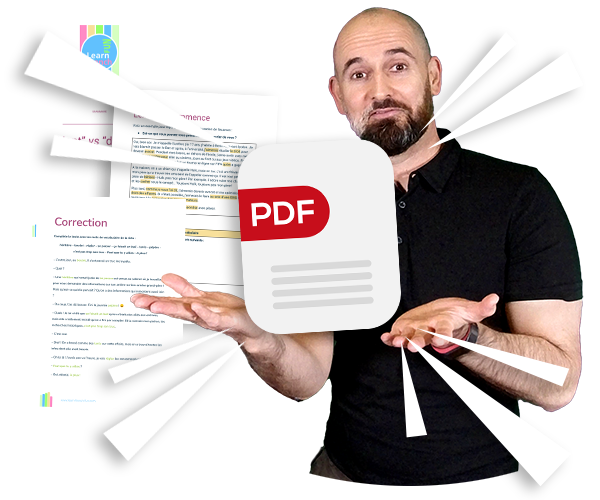
We have prepared a free PDF to help you with the French beach vocabulary . 👉 Download it for free
You will find a summary of the lesson , exercises to practice and the correction .
Key vacation phrases
What better way to get into the holiday spirit than by learning some French vocabulary? Here are a few key phrases and words that will come in handy during your next festive gathering.
- Les vacances – Holidays
- Bonjour/bonsoir – Hello/good evening
- Comment ça va ? – How are you?
- Je vais bien, merci. – I’m fine, thank you.
- Désolé, je ne parle pas très bien français. Pourriez-vous parler plus lentement s’il vous plaît ? – Sorry, I don’t speak French very well. Could you please speak more slowly?
- Je voudrais réserver une table pour 4 personnes à 19h – I would like to reserve a table for 4 people at 7pm
- J’ai une réservation au nom de M./Mme [your name] – I have a reservation in the name of Mr./Ms. [your name].
- Est-ce que vous avez une carte en anglais ? – Do you have a card in English?
- Pourrions-nous avoir l’addition s’il vous plaît ? – Could we have the bill please?
- On paye par carte / en espèces – We pay by card / in cash
- A quelle heure commence l’activité / le spectacle ? – What time does the activity / show start?
- A-t-on le droit de fumer ici ? – Are we allowed to smoke here?
- Avez-vous un cendrier ? – Do you have an ashtray?
- Avez-vous du feu ? – Do you have a light?
- Pardon, la fumée ne vous dérange pas ? – Excuse me, do you mind the smoke?
- Je voudrais un café avec un verre d’eau – I would like a coffee with a glass of water ( in France, when you order a coffee, you get an espresso. If you want a long coffee, you have to order an Americain or café allongé )
Do you like learning French with videos?
Receive our free video newsletter every Friday in your e-mail box. You will get 3 “Tips & Tricks” on grammar , vocabulary , phonetics or French culture . 👉👉 Sign up now!

💡 In general, don’t be afraid to be overly polite and add s’il vous plaît (please) at the end of all your questions. The French always feel that foreigners are arrogant with them… Yes, I know, it’s the world upside down! 😂😂
Also, don’t be surprised if the staff in restaurants, cafes and other places that receive tourists seem, at first, cold and distant. In France, it is because you will come back regularly to the same place that the staff will be more and more friendly with you.
And now, a selection of items that we love to see because they are synonymous with vacations 🌞🌞
Vacation items in French

@learnfrenchfun Le littoral, le bord de mer, la côte… 👉 VIDEO LONGUE : youtube / @LearnFrenchFun 👉 PDF BONUS : bit . ly / 455n5pX #parlarefrancese #francese ♬ son original – Chez Prisc & Chris – Learn French Fun
Ask for directions in French
- Quel est le chemin pour aller à la gare / la plage / la rue blablabla ? – What is the way to go to the station / the beach / the street blah blah blah?
- Vous allez tout droit – You go straight ahead
- Vous tournez à droite – You turn right
- vous tournez à gauche – you turn left
- Vous continuez tout droit – You go straight on
- Vous prenez la première rue à droite/gauche – You take the first street on the right/left
- Après le rond-point, c’est à gauche/droite – After the traffic circle, turn left/right
- Vous êtes beaucoup trop loin, faites demi-tour – You are too far, turn around
- Traversez la rue / l’avenue / le boulevard et vous êtes arrivés – Cross the street / avenue / the boulevard and you have arrived
What are some French useful vocabulary words related to travel?
When you’re planning a trip to France, it’s helpful to know a few key phrases in the local language. After all, even the most basic conversation can be difficult when you don’t share a common language. To get you started, here are a few useful French vocabulary words related to travel.
- bagages – luggage
The first word you’ll need to know is bagage (luggage). This word covers any kind of bag or suitcase that you might bring on a trip, so it’s essential for getting your belongings through customs.
- passeport – passport
Another important word is passeport (passport). This document is required for international travel, so make sure you have it with you before you leave for France.
- avion – airplane // aéroport – airport
If you’re flying to France, you’ll need to know the word for avion (airplane). This will come in handy when booking your ticket and going through security at the airport.
⚠️ Be careful with the verb you use with the word avion . We say: prendre l’avion or aller en avion.
- hôtel – hotel
Once you arrive in France, you’ll need a place to stay. It is the same word as in English with almost identical phonetics. That’s nice.
- taxi – taxi
If you’re not renting a car, you’ll probably need to take a taxi at some point during your trip. The French word for taxi is taxi , which should be easy to remember.
And don’t worry, the UBER application exists and works very well in France. You can ask President Macron … 😂
- restaurant – restaurant
No trip to France would be complete without trying the local cuisine. The word for restaurant will come in handy when you’re ready to find a good meal.
By knowing these key French words, you’ll be better prepared for your next trip to France.
How I spend my Christmas holiday in French?
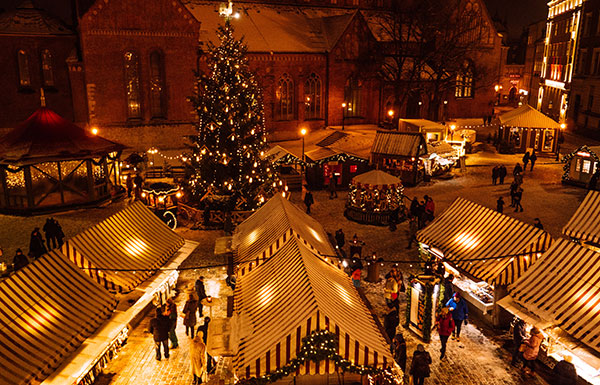
If you’re looking for a truly unique way to spend your Christmas holiday, why not try celebrating in French? France is home to some of the most festive and beautiful Christmas traditions, and spending the holidays in this romantic country is an experience you’ll never forget. Here are a few tips to help you make the most of your French Christmas holiday:
- Start by decorating your house in traditional French style. Think garlands of greenery, strings of lights, and colorful ribbons. Make sure to also put up a star or angel on your Christmas tree.
- On Christmas Eve , enjoy a feast of French delicacies such as foie gras and oysters. Then, attend Midnight Mass at one of France’s stunning cathedrals. Afterward, head out into the streets to enjoy the magical atmosphere of Paris on Christmas night.
- On Christmas Day , open your presents around the tree before sitting down to a lovely family meal. In the afternoon, take a stroll through your neighborhood to admire the festive displays in people’s windows. And don’t forget to enjoy a few tasty treats along the way – after all, what’s Christmas without gingerbread cookies
We have prepared a free PDF to help you about Christmas traditions in France . 👉 Download it for free
French Vocabulary for the Christmas Holidays
- Joyeux Noël – Merry Christmas
- Meilleurs vœux – Best wishes
- La bûche de Noël – The Yule log (a traditional French dessert)
- Un bonhomme de neige – A snowman
- La crèche – Nativity scene
- Le Père Noël – Santa Claus
- Les lutins – elves
- Les marchés de Noël – Christmas markets
- Le sapin – Christmas tree
- Noël – Christmas
- Le Nouvel An – New Year’s Eve
- La Saint-Sylvestre – New Year’s Day
- La fête des Rois – Epiphany
- Les cadeaux – presents
- Galette des Rois – Epiphany cake
- Les rennes – reindeer
- Les chocolats de Noël – Christmas chocolates
- Les bonnes résolutions – New Year’s resolutions
French exam about your holidays in France
A typical exercise topic for a French exam is to talk about your vacation.
Here are some tips:
- Read the instructions carefully and check that you are not being asked to do anything specific (type of writing: blog, email to a friend, essay…)
- Remember to speak in the past tense ! Try to use the imperfect tense for the descriptions ( il faisait beau, les gens étaient sympas …) and the past tense for the main actions ( je me suis beaucoup amusé, j’ai goûté toutes les spécialités de la gastronomie française… )
- Show that you have specific vocabulary about vacations. Use the right words: une chaise longue, un parasol, prendre l’avion …
- Reread your text before handing it in to the teacher!!!
Bon voyage ! And remember, the more French you know, the better your trip will be.
Vive la France !
Now that you have learned some essential travel vocabulary words, it’s time to put them into practice! I hope you have a wonderful time in my beautiful country.
Au revoir !

Articles that might interest you:
- French Vocabulary of Drinks
- 10 french idiomatic expressions with animals
- 10 French idioms related to music
- What English words are from French?
- French all-purpose words
- Make his own French flashcards with vocabulary
- Some tips & tricks to enrich your French vocabulary
- 5 French idioms with everyday objects
- How to eat like a French person?
1 thought on “French vocabulary for the holidays”
- Pingback: Is it possible to learn French language near me? – Blog Learn French Fun
Comments are closed.
You are using an outdated browser. Please upgrade your browser or activate Google Chrome Frame to improve your experience.
50+ Important French Vacation Words and Phrases (With Audio)
Whether you enjoy the feel of seawater and hot sand or the crisp mountain air, there’s nothing like a relaxing vacation.
However you choose to vacation, wouldn’t you love to do it all in French?
Here are 50+ useful French vacation vocabulary words and phrases , with example sentences so you can use them correctly in context.
So grab that passport and let’s get started!
French Vacation Vocabulary for a Smooth Trip
Talking about vacation plans, vacation accommodation, modes of transport, vacation activities, tips to learn vacation vocabulary, drill flashcards before your trip, visualize the vocabulary, watch authentic french videos, start using the words in your own sentences, and one more thing....
Download: This blog post is available as a convenient and portable PDF that you can take anywhere. Click here to get a copy. (Download)
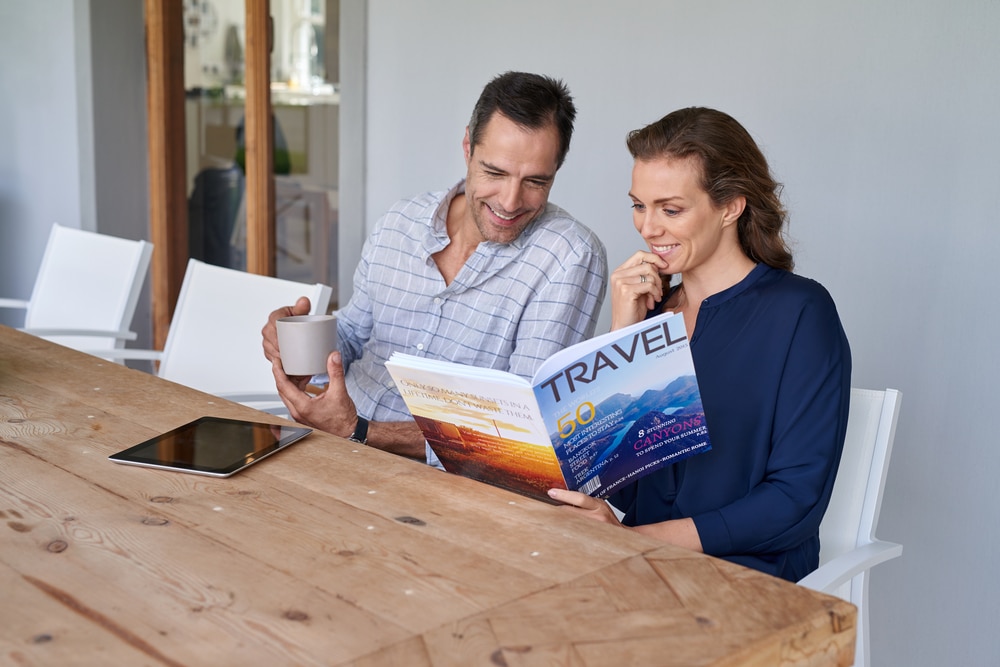
This topic will require you to get comfortable with some basic interrogatives in French .
Common questions and answers
- où ? (where?)
- quand ? (when?)
- avec qui ? (with whom?)
- Comment voyages-tu ? (How are you traveling?)
- Je vais au / à la… (I’m going to…)
- pendant (during)
Vacation seasons
- les vacances de Noël ( Christmas vacation )
- les vacances d’été ( summer vacation , also known as les grandes vacances )
- les vacances d’hiver ( winter vacation )
- les vacances de printemps ( spring vacation )
- les vacances de la Toussaint ( fall vacation ; All Saints)
Example sentences
Où vas-tu en vacances ? (Where are you going on vacation?)
Je vais à la plage / à la montagne / à l’étranger. (I’m going to the beach/to the mountains/overseas.)
Quand iras-tu en vacances ? (When will you go on vacation?)
Je voyagerai pendant les vacances d’été. (I will travel during the summer vacation.)
Avec qui allez-vous voyager / vas-tu voyager ? (Who are you going to travel with?)
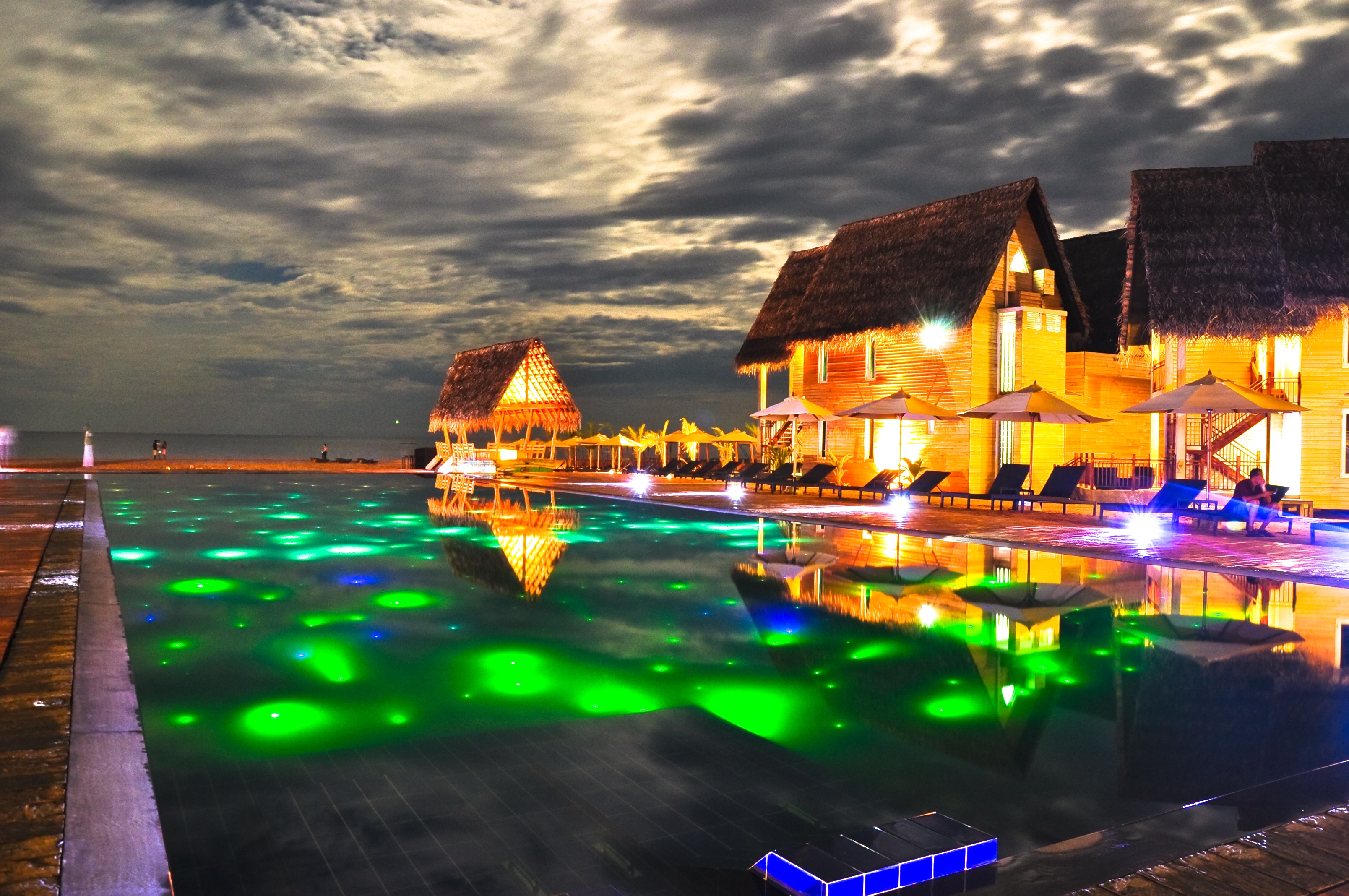
Places people stay on vacation
- un hôtel (a hotel)
- une auberge de jeunesse (a youth hostel)
- un club de vacances (a resort)
- un camping (a camping ground)
- un appartement (an apartment)
- un gîte (a holiday home/cottage)
- une chambre d’hôtes (a bed and breakfast)
Phrases for making a reservation
- Je voudrais une chambre (I would like a room…)
- salle de bains (bathroom)
- pour une / deux / trois / quatre personnes (for one/two/three/four people)
- du… au… (from [date] to [date])
Je voudrais une chambre pour deux personnes avec salle de bains du 5 août au 12 août. (I would like a room for two with a bathroom from August 5 to August 12.)
Pour mes vacances, je vais loger dans un hôtel. (For my vacation I am going to stay in a hotel.)
Je logerai dans une auberge de jeunesse. (I will stay in a youth hostel.)
L’année dernière, j’ai logé dans un camping. (Last year, I stayed in a camping ground.)
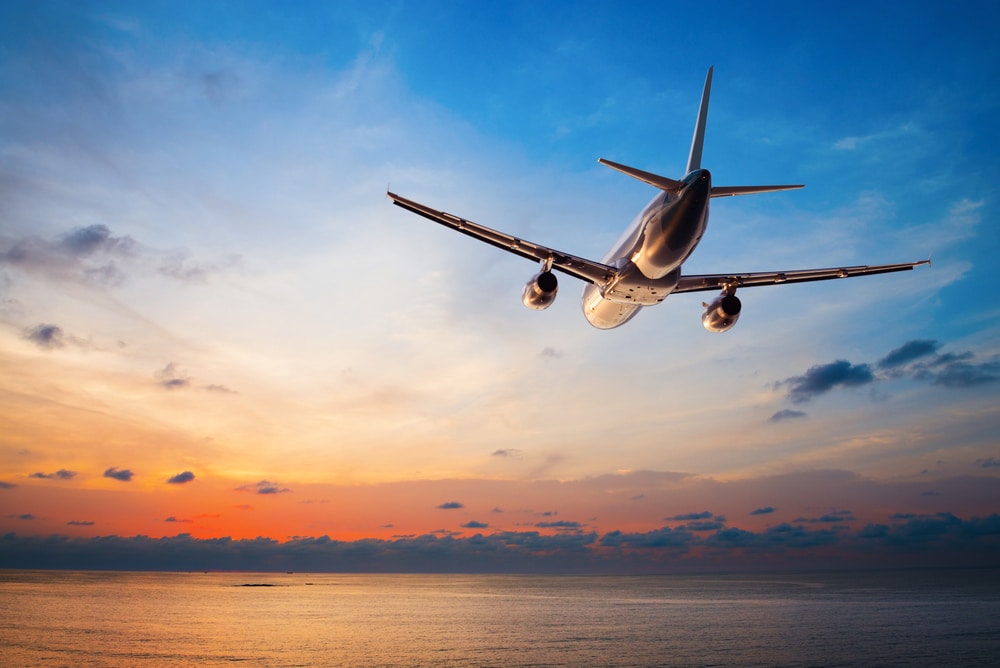
Getting to your destination
- en avion (by plane)
- l’aéroport (airport)
- en bateau (by boat)
- en train (by train)
- la gare (the station)
- le billet (the ticket)
- aller-retour (round trip)
Getting around your vacation spot
- en métro (by subway)
- en bus (by bus)
- en taxi (by taxi)
- à pied (on foot)
Comment vas-tu en Belgique ? En avion ou en train ? (How are you going to Belgium? By plane or by train ?)
Où est l’aéroport, s’il vous plaît ? (Where is the airport, please?)
Je cherche la gare. (I am looking for the train station .)
À quelle heure est le départ de l’avion ? (What time does the plane leave?)
Combien coûte le billet pour Nice ? (How much does the ticket to Nice cost?)
Je voudrais un aller-retour pour le train qui va à Marseille. (I would like a return ticket on the train going to Marseille.)

This topic is a great opportunity to pick up common French nouns and verbs . There are hundreds of activities that you can add to your vocabulary list. Some common ones include:
- faire de la planche à voile (to windsurf)
- faire du lèche-vitrine (to go window-shopping )
- bronzer (to suntan)
- aller au restaurant (to go to the restaurant)
- nager (to swim)
- faire du ski (to ski)
- faire une randonnée (to go hiking)
- faire du vélo (to cycle)
- visiter des monuments / des musées (to visit monuments/museums)
- participer à une visite guidée (to join a guided tour)
Try to use this vocabulary with different tenses!
Aujourd’hui, je voudrais aller à la plage pour bronzer. (Today, I would like to go to the beach to suntan.)
Hier, je suis allé(e) faire du vélo en montagne. (Yesterday, I went cycling in the mountains.)
Demain, j’irai au restaurant avec mes amis. (Tomorrow, I will go to the restaurant with my friends.)
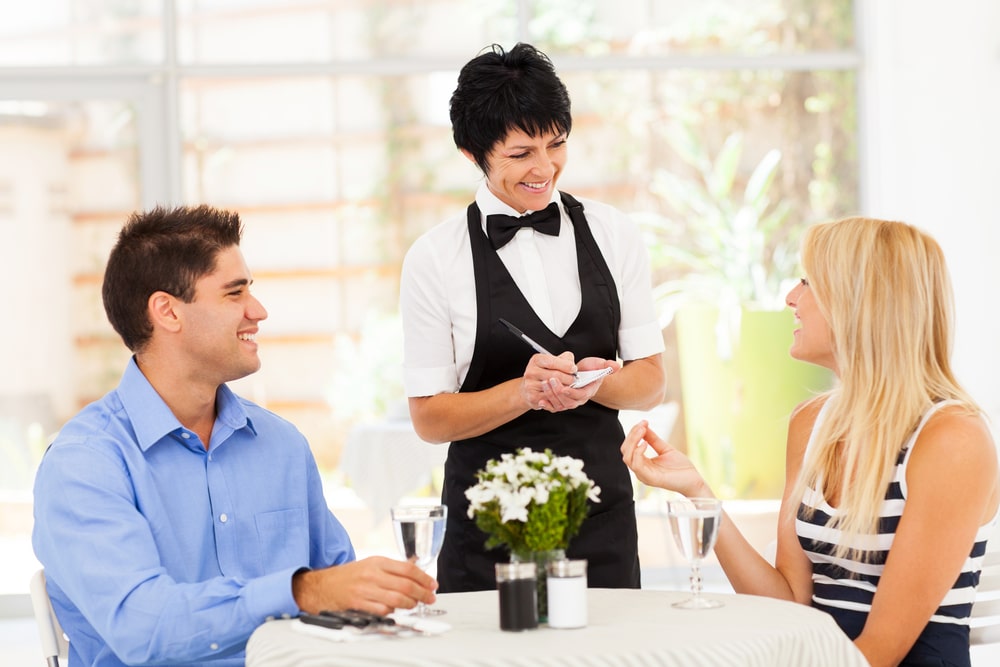
One of the best parts of going on a holiday in France is getting to eat out and sample food. So, food vocabulary should be in the cards. We’ll give you the basics for a vacation— for an in-depth guide to restaurant vocabulary in French, check out this article.
- le repas (the meal)
- le petit déjeuner (breakfast)
- le déjeuner (lunch)
- le dîner (dinner)
- la salle à manger (the dining room)
- le restaurant (restaurant)
- Qu’est-ce que vous recommandez aujourd’hui ? (What do you recommend today?)
- le plat du jour (today’s special)
- Je voudrais… (I would like…)
- L’addition, s’il vous plaît. (The check, please.)
À quelle heure est le petit déjeuner ? (What time is breakfast ?)
Comme dessert, je voudrais la crème caramel. (For dessert, I would like the crème caramel.)
Recommandez-vous le plat du jour ? (Do you recommend today’s special?)
Je voudrais des escargots. (I would like some snails.)
Make flashcards for the words above and go through them periodically before your trip. You don’t even need to carry around a stack of index cards—there are apps like Quizlet for creating flashcards online and even playing games to test yourself.
French vacation words tend to be highly visual, so consider making mind maps , or visual diagrams that represent the words you want to learn. There are many examples of mind map templates online.
You can also create a memory palace . The idea of this memorization device is to visualize a location—say, your childhood home—and populate it with the relevant vocabulary. For example, you could visualize a building and each hallway, room or object would be associated with a word you wish to remember.
It’s a great technique for visual learners to create context for seemingly isolated terms.
The best way to remember any new French vocabulary is to learn it in context. And one of the best ways to do that is to watch videos in French from French sources. You can easily find French TV shows and movies on streaming services like Netflix. If you prefer shorter videos, you can find French videos about all sorts of topics on YouTube.
FluentU is another way to hear French how it’s spoken in actual French-speaking regions. It’s a language learning program that uses authentic videos with interactive subtitles as the core of its lessons, along with active learning features like flashcards and quizzes.
The videos on FluentU are sorted by topic, so you can easily find media that’s related to travel, such as news clips about French vacation habits or video tours of French open-air hotels.
You’ll be using the words and phrases below with real French speakers throughout your vacation. So, why not start practicing now?
For example, don’t just learn the word nager (to swim). Start creating sentences, like:
Où est la plage ? J’aimerais nager cet après-midi. (Where is the beach? I would like to swim this afternoon.)
Savez-vous nager ? (Do you know how to swim?)
To ensure your own sentences actually make sense, you can use a grammar checker like Bon Patron .
Now that you’ve used all the tools and resources at your fingertips and you’ve prepared everything for your vacation, you’re ready to go.
Use your new vocabulary as often as you can and you’ll become good at communicating and recognizing repeated words.
Bonnes vacances ! (Have a good vacation!)
FluentU has a wide variety of great content, like interviews, documentary excerpts and web series, as you can see here:

FluentU brings native French videos with reach. With interactive captions, you can tap on any word to see an image, definition and useful examples.

For example, if you tap on the word "crois," you'll see this:

Practice and reinforce all the vocabulary you've learned in a given video with learn mode. Swipe left or right to see more examples for the word you’re learning, and play the mini-games found in our dynamic flashcards, like "fill in the blank."

All throughout, FluentU tracks the vocabulary that you’re learning and uses this information to give you a totally personalized experience. It gives you extra practice with difficult words—and reminds you when it’s time to review what you’ve learned.
Start using the FluentU website on your computer or tablet or, better yet, download the FluentU app from the iTunes or Google Play store. Click here to take advantage of our current sale! (Expires at the end of this month.)
Enter your e-mail address to get your free PDF!
We hate SPAM and promise to keep your email address safe


€ 5.00
In this sample opinion question on ‘ Staycation ’ you will also find the grammatical constructions used, and a list of vocabulary to help you in creating your own masterpiece. This opinion question is written in both French and English.
- Firstly, we cover, the structure of an opinion piece.
- Secondly, we go through, what to put into each section of your opinion piece.
And much more…
Description
Could this topic make an appearance in the Leaving Cert French Exam? Well yes is the answer to that. The topics which appear on the leaving cert French exam are very broad. If you think that it would be impossible to write about this, let us here at French Notes take the problem and give you the solution. You will receive a sample opinion question, written in both French and English, with a key to the grammatical constructions used, and a list of vocabulary to help you in creating your own masterpiece.
- Secondly, we go through what to put into each section of your opinion piece.
- For example, we give you examples of how to use the vocabulary and grammatical constructions throughout the piece.
- In short, all our opinion pieces act as guides for your own writing.
- To clarify, all our opinion pieces are written by experienced teachers and/or examiners.
- 25 key words to learn on the topic.
- Phonetics to learn how to pronounce key vocabulary.
- Grammatical constructions written in both English & French.
Staycation is one of many different titles available on our website. We cover all the topics that are relevant to the Leaving Cert French exam. If you think that it would be impossible to write an opinion question, at French Notes we give you the solution and help you in creating your own masterpiece.
For More French Opinion Questions
Related products
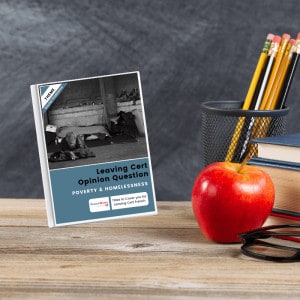
Poverty and Homelessness

The World of Social Media

Professional Inequality
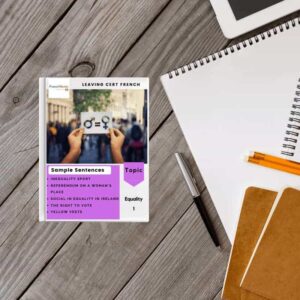
Equality Booklet 1
Privacy overview.
2nd & 3rd Year Easter Break MasterClass 5th & 6th Year Easter Break MasterClass
Part of French Topics
Media and technology
- count 12 of 12
Greetings and introductions
- count 1 of 12
Family and pets
- count 2 of 12
Frenchlanguagebasics 🇫🇷
Learn French the fast and easy way!
10 French sayings about holidays
Holidays are a time for relaxation, enjoyment, and reflection, and French culture has a rich tradition of sayings and expressions related to this topic.
Here are 10 popular French sayings about holidays:
1. “Les vacances, c’est la période la plus attendue de l’année.”
– Holidays are the most anticipated period of the year.
2. “Les vacances, c’est le moment de se reposer et de se ressourcer.”
– Holidays are a time to rest and recharge.
3. “Le soleil, la mer et le sable, voilà les ingrédients d’un bon séjour.”
– Sun, sea, and sand, these are the ingredients for a good stay.
4. “Les vacances, c’est le temps de la découverte et de l’aventure.”
– Holidays are a time for discovery and adventure.
5. “Les vacances, c’est le temps des souvenirs inoubliables.”
– Holidays are a time for unforgettable memories.
6. “Les vacances, c’est le moment de se retrouver en famille.”
– Holidays are a time to be with family.
7. “Les vacances, c’est l’occasion de découvrir de nouvelles cultures.”
– Holidays are an opportunity to discover new cultures.
8. “Les vacances, c’est le moment de s’évader de la routine.”
– Holidays are a time to escape from routine.
9. “Les vacances, c’est le temps de la détente et de la relaxation.”
– Holidays are a time for relaxation and relaxation.
10. “Les vacances, c’est le moment de se ressourcer et de se reconnecter avec soi-même.”
– Holidays are a time to recharge and reconnect with oneself.
In conclusion, French sayings about holidays highlight the importance of taking time off and enjoying life.
These expressions emphasize the value of rest, relaxation, and creating memories with loved ones.
Whether it’s exploring new places, spending time with family, or just taking a break from the routine, French culture recognizes the significance of holidays and the role they play in overall happiness and well-being.
©Frenchlanguagebasics.com
Leave a Comment Cancel reply
Save my name, email, and website in this browser for the next time I comment.
Privacy Overview
- International
- Schools directory
- Resources Jobs Schools directory News Search
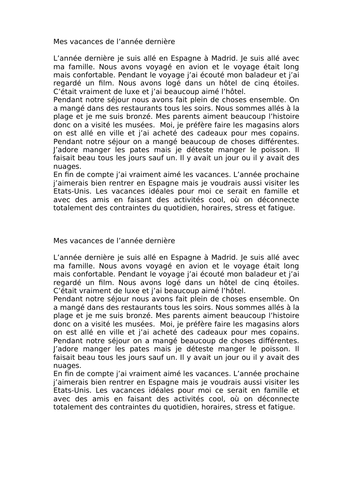
Mes vacances de l'année dernière - last years holiday
Subject: French
Age range: 14-16
Resource type: Lesson (complete)
Last updated
12 February 2021
- Share through email
- Share through twitter
- Share through linkedin
- Share through facebook
- Share through pinterest

Model essay on holidays in the past tense Could be used as a translation exercise Find the French for
Creative Commons "Attribution"
Your rating is required to reflect your happiness.
It's good to leave some feedback.
Something went wrong, please try again later.
This resource hasn't been reviewed yet
To ensure quality for our reviews, only customers who have downloaded this resource can review it
Report this resource to let us know if it violates our terms and conditions. Our customer service team will review your report and will be in touch.
Not quite what you were looking for? Search by keyword to find the right resource:
Essay Service Features That Matter
- Dissertation Chapter - Abstract
- Dissertation Chapter - Introduction Chapter
- Dissertation Chapter - Literature Review
- Dissertation Chapter - Methodology
- Dissertation Chapter - Results
- Dissertation Chapter - Discussion
- Dissertation Chapter - Hypothesis
- Dissertation Chapter - Conclusion Chapter
Deadlines can be scary while writing assignments, but with us, you are sure to feel more confident about both the quality of the draft as well as that of meeting the deadline while we write for you.
Customer Reviews

Finished Papers
Get access to the final draft
You will be notified once the essay is done. You will be sent a mail on your registered mail id about the details of the final draft and how to get it.


IMAGES
VIDEO
COMMENTS
French Essays About Holidays. During my last vacation I went to France. My mum arranged this tour for me and my friends. We travelled there by plane. We went France last summer. So the weather was bright and hot around 23- 30 degrees. It was the best weather for camping but we stayed in Champs Elysees hotel.
Having taught French GCSE in London, I prepared this interactive GCSE French online course to help my students learn faster while managing the learning at their own pace. The topics include : Travel and tourism : talking about holidays in French. School : Talking about your favourite subject at school.
For higher French as a foreign Language (FFL) levels, it is interesting to work on written expression on this question. In writing, an essay for example, the story of the holidays can be developed further but the exercise will lose its interactive and playful side. On the other hand, to tell their vacation, students can rely on their travel diary.
Learn about holidays and tourism for French GCSE (AQA). Practise your reading, listening and writing skills.
iv) Jour de Noël - Christmas Day. Public holiday in France: Yes. When: December 25th. France is a secular country, but Christmas is Christmas. There are many French Christmas traditions, but it is the traditional dinner that is the most important. A French Christmas family dinner will on average lasts 4-5 hours.
Public Holidays in France. The French observe 11 official public holidays. 5 of them are civil holidays: New Year's Day (Jour de l'An), May Day (1er Mai or Fête du Travail), Victory in Europe Day (8 mai 1945), Bastille Day (Fête Nationale), and. WWI Armistice Day (Armistice du 11 novembre 1918).
Transcript. Hello to all of you. I hope that you are doing well and that your learning of French is going well. So today, I will tell you about my vacations in French. The goal of this video is for you to learn new expressions, new phrases, new vocabulary so that you too can tell your vacation in French. Don't hesitate to comment the words or ...
French Essays About Holidays. During my last vacation I went to France. My mum arranged this tour for me and my friends. We travelled there by plane. We went France last summer. So the weather was bright and hot around 23- 30 degrees. It was the best weather for camping but we stayed in Champs Elysees hotel.
This resource is a series of seven GCSE French sample essays based on the most common topics: Holidays, School, Hobbies, My Area, Family, Chores and Visits. It follows the NEW GCSE/IGCSE format for the essay writing: 4 bullet points, around 150 words, 3 tenses. Each essay includes a range of A star structures and has the translation in English ...
Revise the topic of holidays and tourism for French GCSE (Edexcel). Learn to understand others and practise your reading, listening and writing skills.
French exam about your holidays in France. A typical exercise topic for a French exam is to talk about your vacation. Here are some tips: Read the instructions carefully and check that you are not being asked to do anything specific (type of writing: blog, email to a friend, essay…) Remember to speak in the past tense!
On va en vacances en Italie chaque année. - We go to Italy on holiday every year. Les vacances au bord de la mer sont très reposantes. - Holidays by the sea are very relaxing. Je préfère ...
So, food vocabulary should be in the cards. We'll give you the basics for a vacation— for an in-depth guide to restaurant vocabulary in French, check out this article. le repas (the meal) le petit déjeuner (breakfast) le déjeuner (lunch) le dîner (dinner) la salle à manger (the dining room) le restaurant (restaurant)
Do you want to learn some useful French expressions for the holiday season? Whether you celebrate Christmas, New Year, or other festive occasions, this article will help you enrich your vocabulary and impress your French friends. Discover 54 French words and phrases related to the holidays with Talk in French.
Staycation. € 5.00. In this sample opinion question on ' Staycation' you will also find the grammatical constructions used, and a list of vocabulary to help you in creating your own masterpiece. This opinion question is written in both French and English. Firstly, we cover, the structure of an opinion piece. Secondly, we go through, what ...
French holidays mini essay. ... L'année prochaine, pendant les vacances d'été, je vais en France et je vais rester dans un hôtel au centre de Paris. J'irai avec mon frère, mes parents et mes grands-parents. Mon frère, mes grands-parents et moi voyageons en train, l'Eurostar, car il est très rapide et n'est pas trop cher.
Find out how much you know about holidays in French with this short quiz. More on Topics. Find out more by working through a topic. School. count. 11 of 12. Media and technology. count ...
French Essays About Holidays. During my last vacation I went to France. My mum arranged this tour for me and my friends. We travelled there by plane. We went France last summer. So the weather was bright and hot around 23- 30 degrees. It was the best weather for camping but we stayed in Champs Elysees hotel.
French holidays essay. STUDY. PLAY. En ce qui concerne les vacances, je préfère partir à l'etranger car j'aime connaitre une culture différente et je trouve que j'ai plus de liberté quand je suis en vacance à l'étranger. En revanche passer les vacances en Angleterre c'est moins cher, mais il fait trop froid et le ciel est toujours gris.
Here are 10 popular French sayings about holidays: 1. "Les vacances, c'est la période la plus attendue de l'année.". - Holidays are the most anticipated period of the year. 2. "Les vacances, c'est le moment de se reposer et de se ressourcer.". - Holidays are a time to rest and recharge. 3.
Model essay on holidays in the past tense Could be used as a translation exercise Find the French for . International; Resources; Jobs; Schools directory; News; Courses; Store; Chat ... Model essay on holidays in the past tense Could be used as a translation exercise Find the French for. Creative Commons "Attribution" Reviews Something went ...
French Essays About Holidays, Introduction Sample Thesis Writing, Essay On Flower In Hindi For Class 1, Resume Examples For Broadcasting, How Should The Title Of An Essay Look, Essay On World Peace The Need Of The Hour, How To Organize Your Dissertation Notes Technology Category
Robert. Email: 1722Orders prepared. Level: College, High School, University, Master's, PHD, Undergraduate. French Essays Holidays, Case Study Conducted, Essay Writing On Focus, Custom Critical Thinking Editing Sites For Mba, Learn How To Write Better, Accounting Services Business Plan, Aqa Mest 3 Case Study. ID 7766556.